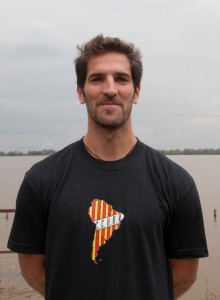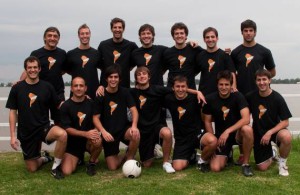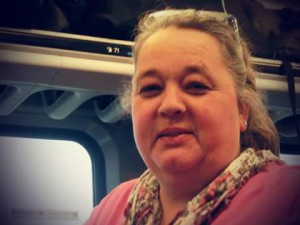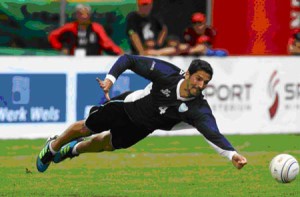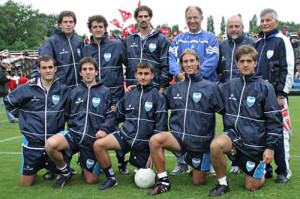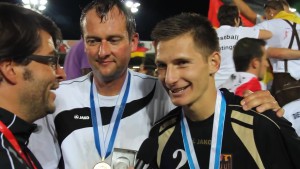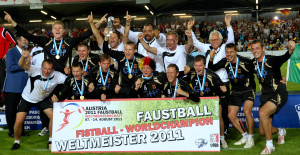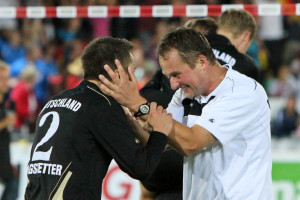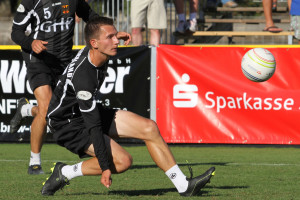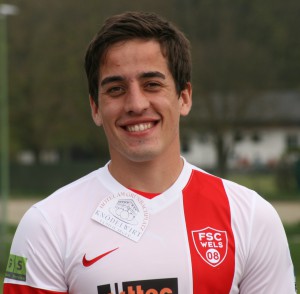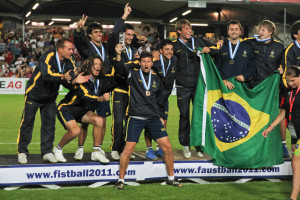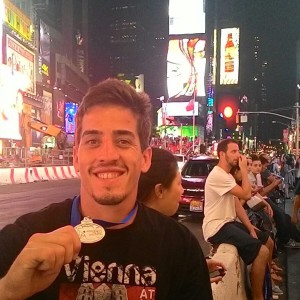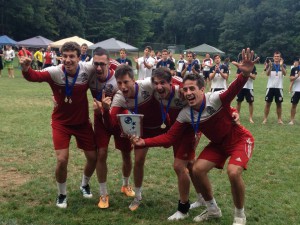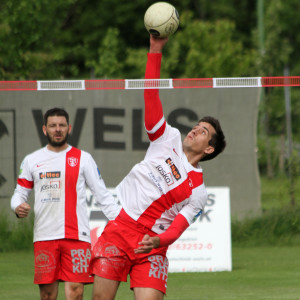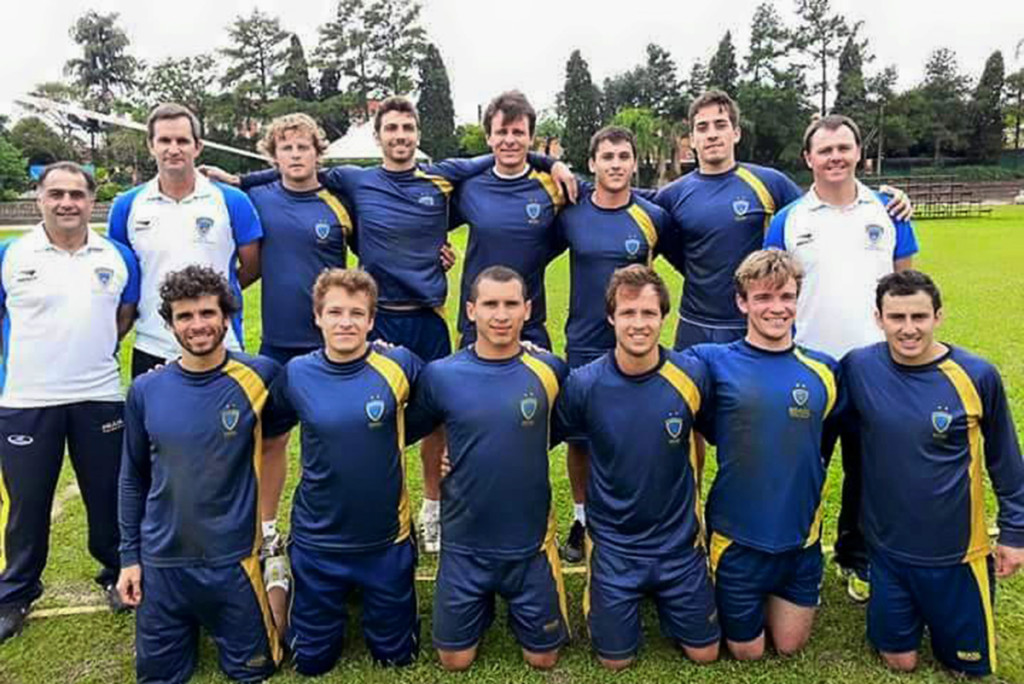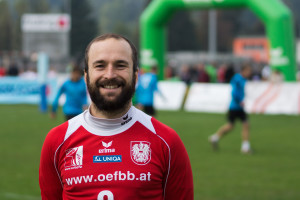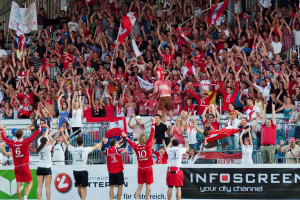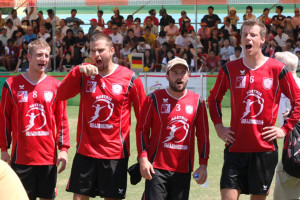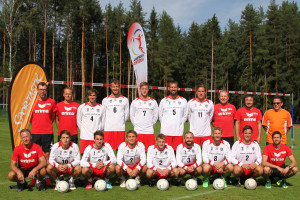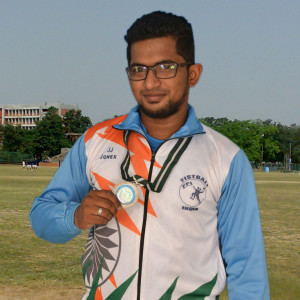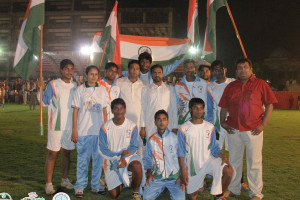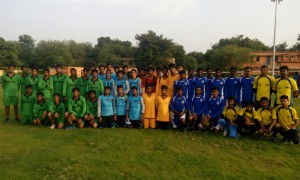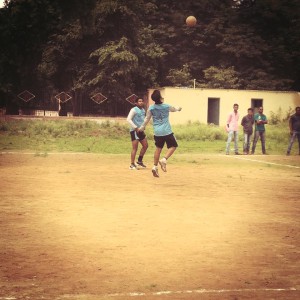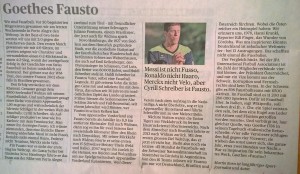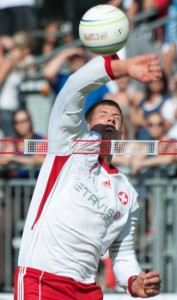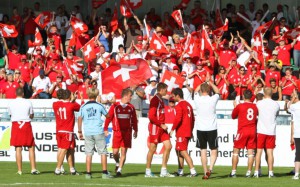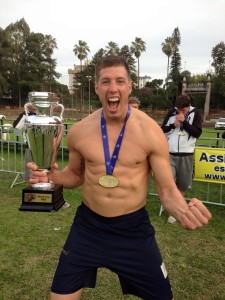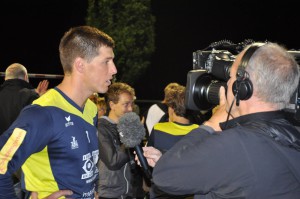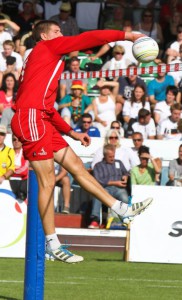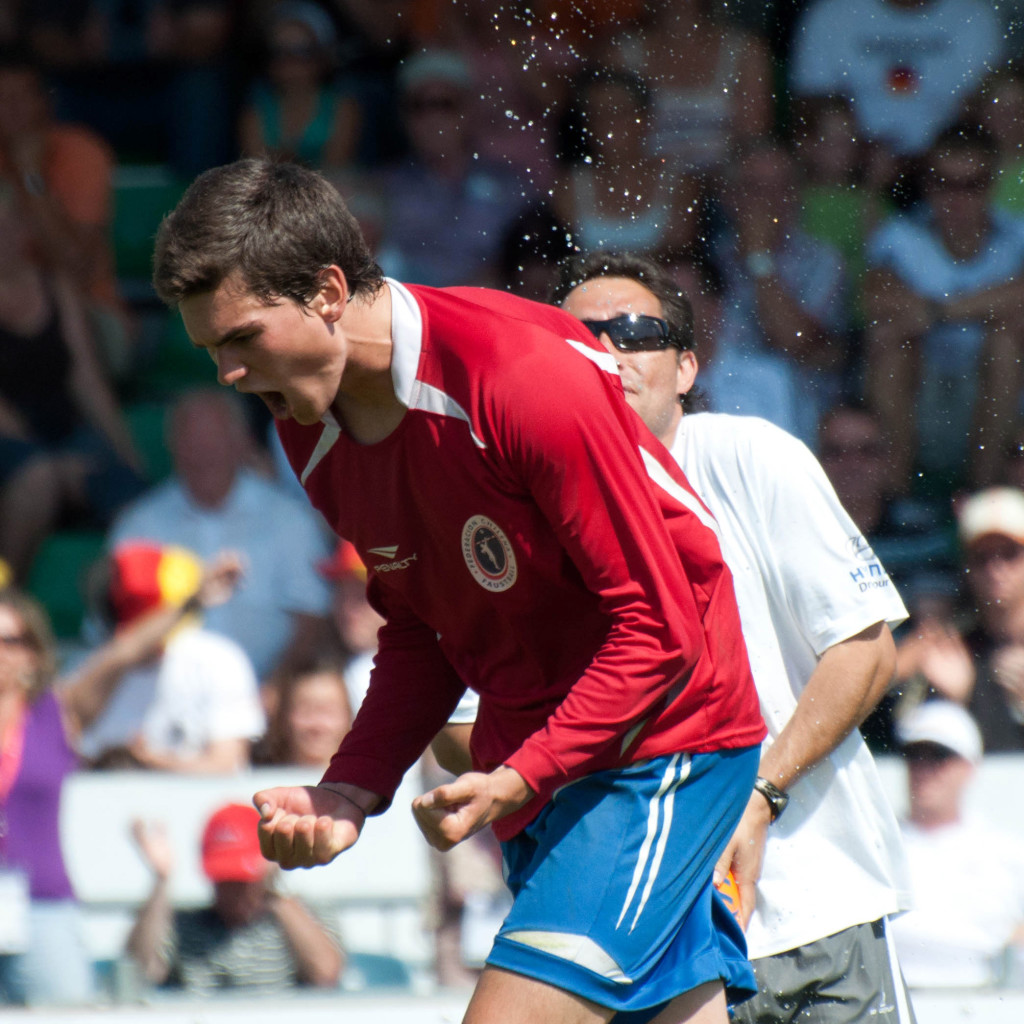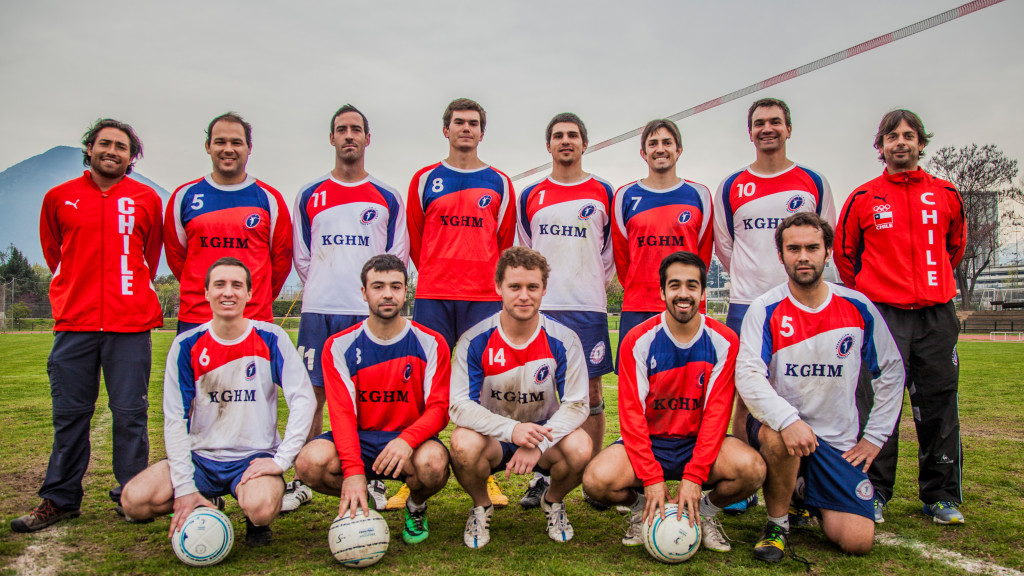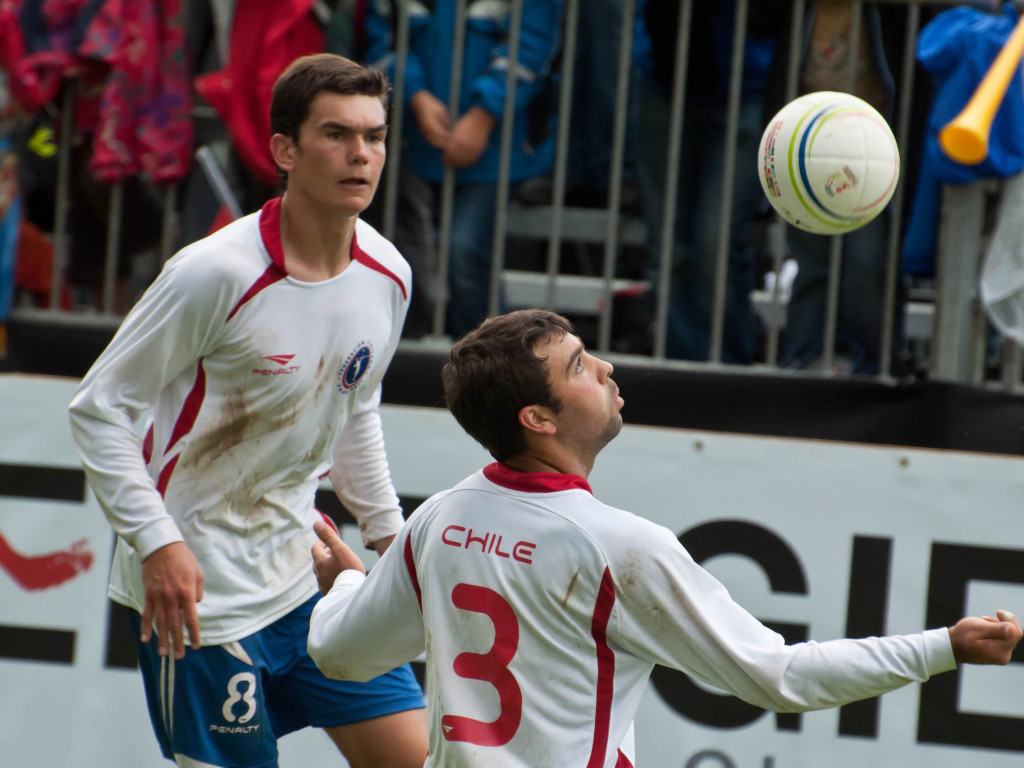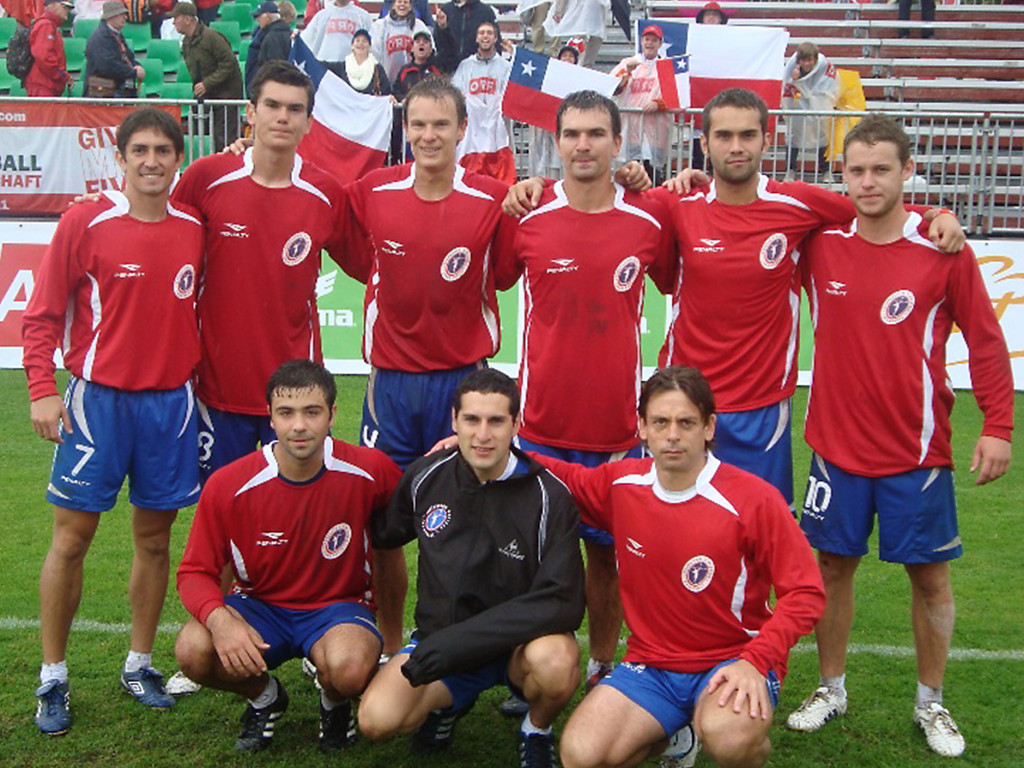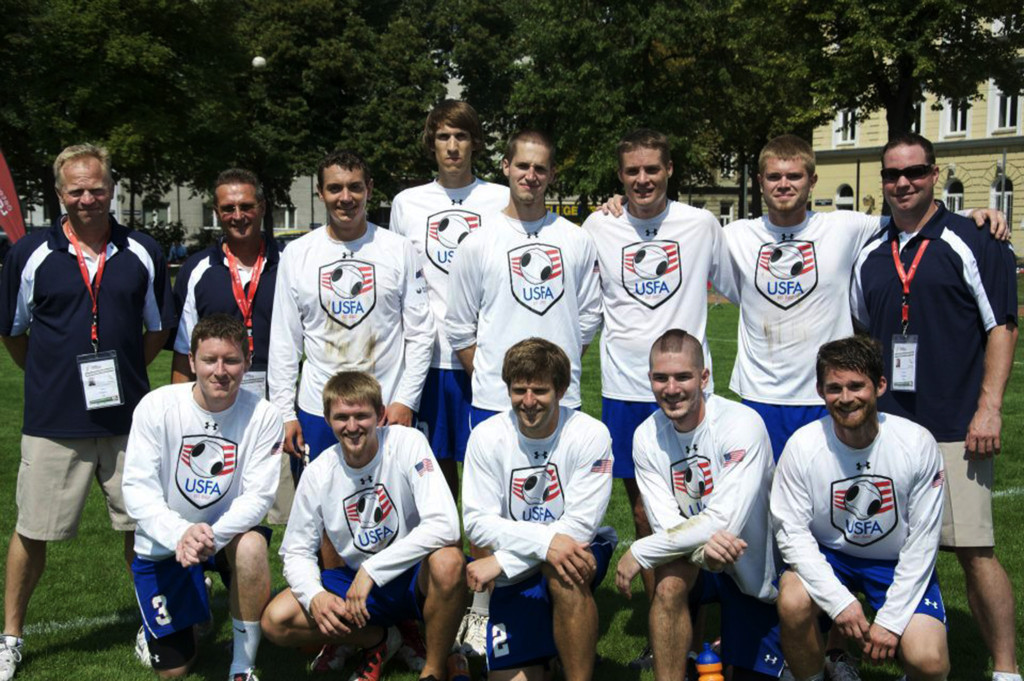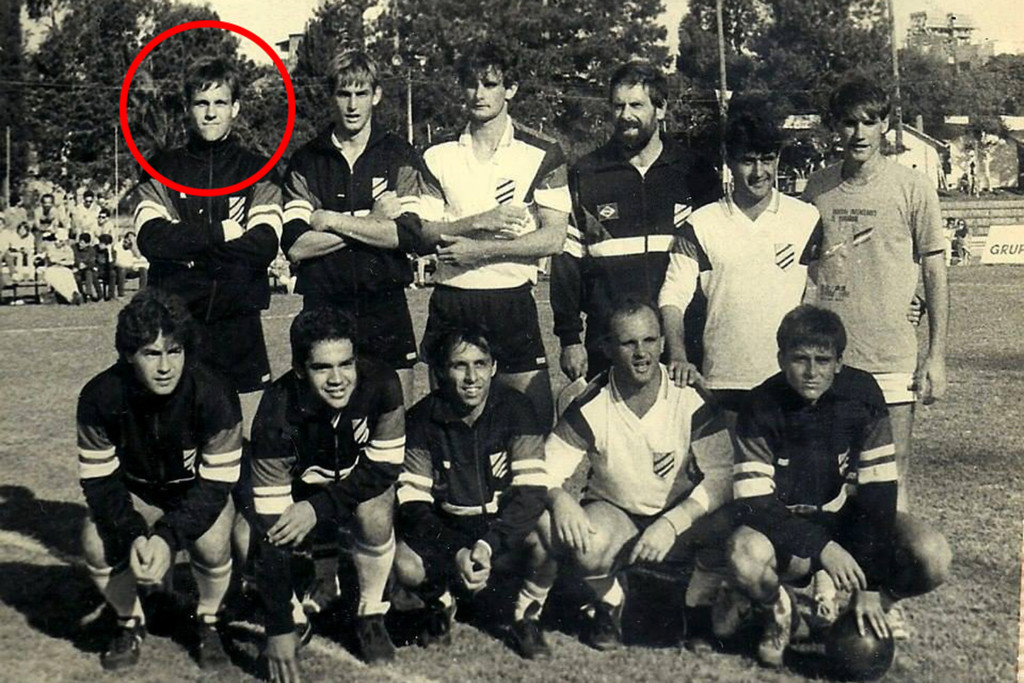Alle Beiträge von Roger Willen
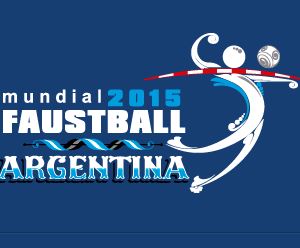
Livestream
Fistball World Championship – Livestream from Argentina – Faustball Weltmeisterschaft – Livestream aus Argentinien
Road to Argentina – Final Part/Letzter Teil – Team Argentina, Interview with Martin Vazquez Striker and Gisela Abt from the organizing committee
.
ENGLISH VERSION BELOW
Wir haben Martin Vazquez, den Hauptangreifer der argentinischen Nationalmannschaft, und Gisela Abt vom OK der Weltmeisterschaft zum letzten Teil unserer „Road to Argentina“-Serie getroffen.
Zunächst sprechen wir mit Martin Vazquez:
IFA: Hallo Martin, Weltmeisterschaft im eigenen Land…. Der größte Moment für jeden Sportler?
Martin Vazquez: Ja, mit Sicherheit. Es ist unsere große Chance den Leuten hier zu zeigen, was wir tun und ihnen den besten Faustball der Welt zu präsentieren.
IFA: Letztes Mal habt ihr die „Phalanx“ der großen Vier durchbrochen und seid bis ins Halbfinale gekommen. Ein Ausnahmefall oder werdet ihr das wiederholen?
Vazquez: Ich denke nicht, dass es eine Ausnahme war. Wir haben sehr hart trainiert und unsere Gegner intensiv studiert. Heute sind wie vier Jahre später, sind erfahrener, älter -vor allem ich! (lacht) und haben einige junge Spieler dabei…. Seit wir mit der Vorbereitung für die WM angefangen haben, haben wir es gemacht mit dem Gedanken, dass wir erneut das Halbfinale erreichen wollen. Wir wissen, dass es nicht einfach sein wird, aber wir wollen 2011 wiederholen.
IFA: Euer Team ist im Vergleich zu 2011 fast unverändert. Könnte das der Schlüssel sein den vierten Platz zu verteidigen oder gar zu verbessern?
Vazquez: Möglicherweise. Fast alle waren im Halbfinale dabei, wir wissen was wir tun müssen um da wieder hinzukommen und wir müssen noch ein paar Dinge verbessern um solche Spiele zu gewinnen. Es wird nicht einfach, wir müssen alle in Topform sein an diesen Tagen und wir hoffen dass wir von dieser Erfahrung profitieren können.
IFA: Was ist allgemein euer Ziel für die Heim-WM? Habt ihr ein Auge auf die Medaillen geworfen?
Vazquez: Wir wollen in unserem eigenen Land Geschichte schreiben und wir werden den Angriff auf die Medaillen wagen… Ich wiederhole, es wird nicht einfach, aber das ist unser Traum.
IFA: Es werden einige neue Länder zum ersten Mal dabei sein. Kennst du schon welche davon? Was denkst du allgemein über diese Entwicklung?
Vazquez: Nein, ich kenne nur das Team von Kolumbien. Eine junge Mannschaft die bei den letzten Turnieren sehr gewachsen ist. Sie haben an der letzten Südamerikameisterschaft und auch an den Panamericans teilgenommen. Ich denke so viele Neulinge gab es noch nie bei einer Weltmeisterschaft, etwas großartiges für den Faustball und ich hoffe dass es ihnen gefällt und sie motiviert Faustball in ihren Ländern weiter zu entwickeln.
IFA: Ok Martin, vielen Dank für deine Antworten und viel Erfolg bei der Heim-WM.
Nun haben wir noch ein paar Fragen an Gisela Abt.
Hallo Gisela, danke, dass du jetzt im Endspurt dennoch Zeit für uns gefunden hast. Wie lange seid ihr denn jetzt schon in der Vorbereitung?
Abt: Hallo, wir haben mit den ersten Vorbereitungen vor fast 2 Jahren angefangen, aber der Löwenanteil wird selbstverständlich im letzten halben Jahr erledigt.
IFA: Wie dürfen wir uns die Anlage und das ganze Drumherum vorstellen? Wie viele Helfer habt ihr im Einsatz?
Gisela Abt: Die Anlagen wurden extra für die WM angelegt, d.h. es ist alles brandneu. Natürlich haben wir von der hiesigen Gemeinde volle Unterstützung für dieses Projekt bekommen, aber wir haben auch eine Menge Helfer im Einsatz, die freiwillig ihre Zeit opfern, weil sie es toll finden, dass wir hier ein solches Event auf die Beine stellen.
IFA: Was erwartest bzw. erhoffst du dir persönlich von der WM? Wie viele Zuschauer hättest du gerne?
Abt: Also ich persönlich freue mich darauf, eine Menge interessanter Leute kennenzulernen. Natürlich ist die WM auch eine super Werbung für unser Städtchen, das ja in der Hauptsache vom Tourismus lebt.
IFA: Es ist fast soweit… Ist der Stress oder die Vorfreude größer?
Abt: Ich denke das hält sich so ungefähr die Waage, wobei ich zugeben muss, dass je mehr es jetzt darauf zugeht der Stress doch immer mehr zunimmt. Aber ich denke das ist ja völlig normal. Die ganze Veranstaltung ist eine große Herausforderung für mich, aber wir sind uns alle sicher, dass sie ein großer Erfolg wird.
IFA: Ok Gisela, vielen Dank für deine Antworten und toi toi toi, dass alles glatt geht
Jetzt wünschen wir allen Faustballern weltweit viel Spaß bei der Weltmeisterschaft. Wir hoffen euch hat unsere Serie gefallen.
Nico Bitsch, Valentin Weber, Roger Willen – IFA Medien-Komitee
==========
ENGLISH VERSION
We met Martin Vazquez, the main striker of the argentiniean team, and Gisela Abt from the OC of the World Cup for the last part of our series “Road to Argentina”
First we will talk to Martin Vazquez:
IFA: Hello Martin, World Cup in the own country… The greatest moment for every athlete?
Vazquez: Yes for sure, it is our chance to show our people what we do and they see the best fistball of the world.
IFA: Last time you broke through the “big four” and made it to the semifinals. An exceptional case or will you repeat it?
Vazquez: I do not think it has been an exceptional case, we had trained hard and studied our opponents a lot. Today we are four years later, more experienced, older (me;) and some younger players…. Since we started training for the World Cup, we did it thinking at least want to reach the semifinals again. We know it won’t be easy, but we want to rematch 2011.
IFA: You have almost the same team like 2011. Could this be a key to defend or increase your 4th place from Austria?
Vazquez: Can be, we know a lot, and almost all were in that semifinal, we know what we have to do to get and we need to correct in order to win this matches. It is not easy, we have to be all in tune in those days and we hope to profit from this experience.
IFA: What is your target generally for the home event? Are your eyes on the medals?
Vazquez: We want to make history in our country and we will go for a medal… I repeat it is not easy, but that’s our dream…
IFA: There will be many new countries this time. Do you know some of them yet? What do you think about this evolution?
Vazquez: No, I only know the team of Colombia, a young team that has grown much in recent tournaments. They were participating in the South American and the last Panamerican Games. I think this will be the first world cup with many new countries. This is very good for the fistball. I hope they will enjoy it and that motivates them to develop fistball in their countries.
IFA: OK Martin, thank you very much and good luck for you and your team.
Now we have some questions for Gisela Abt:
IFA:Hello Gisela, when have you started with the preparations for the World Cup?
Gisela Abt: We started with the first things almost 2 years ago, but the main part of the work had to be done in the last half year of course.
IFA: How can we imagine the whole constructions and the court site? How many volunteers do you have or need?
Abt: Everything is extra build up for the World Cup, so everything is brand new. Of course we have full support of the local government, but we have a lot of volunteers also, which helps only because they like such a big event is taking place here.
IFA: What are your personal expectations for the event? Of how many visitors are you dreaming?
Abt: I’m looking especially forward to meet many interesting people and of course the World Cup is a great advertising for our town, which gets the main part of his money by tourism.
IFA: It’s almost there…. What is bigger? The stress or the pleasant anticipation?
Abt: They are quite equal, although I have to admit now in the last days the stress is a little higher, but I think that is normal . The whole event is a great challenge for me, but we are sure it will be a big success.
IFA: OK Gisela, many thanks to you and all the best for you and your team.
Now it’s only left to wish the fistball players all over the world lot of fun with the World Cup. We hope you enjoyed our series.
Nico Bitsch, Valentin Weber, Roger Willen – IFA Media Comitee
Road to Argentina – Part/Teil 14 – Team Germany – Olaf Neuenfeld and Fabian Sagstetter – Deutschland
.
„Wir gehen top vorbereitet in die WM, von uns aus kann es sofort losgehen.“
Wir haben Olaf Neuenfeld (seit 2005 Bundestrainer) und Fabian Sagstetter (A-Nationalspieler seit 2009) zum Interview getroffen und nach den Zielen der deutschen Nationalmannschaft in Argentinien befragt.
IFA: Derzeit sind sämtliche internationale Titel, egal ob Jugend, Junioren oder Aktive, Frauen oder Männer, in deutscher Hand – einzige Ausnahme ist der EM-Titel der U18-Mädels. Der Adler auf der Brust scheint derzeit eine Gold-Garantie zu sein. Was ist der Grund für die Dominanz in letzter Zeit?
Neuenfeld: Wenn man sich die einzelnen Ergebnisse der Endspiele einmal anschaut, sieht man, wie knapp jedes Spiel war und das jedes auch genauso gut hätte anders herum ausgehen können. Das ist derzeit nur eine Momentaufnahme, zugegeben aber eine sehr schöne für uns alle. Eine Gold-Garantie ist der Bundesadler aber nicht, jeder Erfolg muss immer wieder hart erarbeitet werden.
Sagstetter: Dass alle wichtigen Titel in Deutschland sind, ist ein hervorragender Zustand, auf dem man sich allerdings nicht ausruhen sollte. Damit es auch in der Zukunft Erfolge zu feiern gibt sollte die Jugend weiter gefördert werden. Auch in den anderen Nationen wird akribisch gearbeitet. Vor allem die Weltspitze bei den Männern ist in den letzten Jahren näher zusammen gerückt.
IFA: Zeichnet sich hier ein längerer Lauf ab, oder war der Umbruch zu jüngeren Spielern in Deutschland nur früher als bei bspw. Österreich oder der Schweiz?
Sagstetter: Im A-Kader wurde der Umbruch schon vor einigen Jahren eingeleitet. Mittlerweile sind wir mit unserem Kader sehr gut eingespielt. Die Schweiz hat ihren Umbruch 2012 eingeleitet und dann sofort den EM-Titel geholt und stand danach bei den großen Turnieren immer im Finale. Auch in Österreich gehe ich von einem Umbruch in den nächsten Jahren aus.
Neuenfeld: Ich hoffe, dass sich ein längerer Erfolgslauf abzeichnet, aber bei der Leistungsdichte gerade im Männerbereich kann man sich da nie sicher sein. Die anderen Nationen setzen auch immer wieder auf junge Spieler und arbeiten ähnlich wie wir. Da sehe ich keine Unterschiede.
IFA: Mit 25 ist Fabian schon einer der erfahreneren Spielern im Team, und dennoch gewinnt Deutschland seit Jahren Titel. Was macht Deutschland der Nachwuchsarbeit besser bzw. anders? Oder haben wir derzeit einfach das Glück einer „Golden Generation“?
Neuenfeld: Wir haben gerade im Männerbereich in Deutschland zwischen den Jahren 2001 und 2010 eine lange Durststrecke ohne Titel gehabt. 2005 haben wir dann angefangen, im Nachwuchsbereich früher und intensiver auf Bundesebene die Talente zu sichten und zu fördern. Bei diesem ersten Bundesnachwuchslehrgang 2005 tauchten das erste Mal Namen wie Fabian Sagstetter, Patrick Thomas, Sebastian Thomas, Tim Albrecht, Niklas Ehrhardt, Carsten Scheerer und Mats Albrecht auf. Diese Spieler sind heute alle Mitglieder im A-Kader und die kontinuierliche Arbeit im Nachwuchsbereich ist für die derzeitigen Erfolge mitverantwortlich. Man kann sicherlich sagen, dass wir aktuell über eine „Goldene Generation“ verfügen.
Sagstetter: Ich denke, dass wir schon in den letzten Jahren immer eine gute Mischung aus erfahrenen und jungen Spielern hatten. Im Jugendbereich haben wir mit Hartmut Maus und Roland Schubert erstklassige Trainer die laufend Talente an den A-Kader heran bringen. Im A-Kader wiederum profitieren wir im Moment von einem sehr breiten Kader, so haben wir auch Spieler die auf einem sehr hohen Niveau sind und den Sprung ins WM-Team in diesem Jahr nicht geschafft haben.
IFA: Fabian, du warst als Spieler schon in Kolumbien, Namibia, Taiwan und natürlich überall in Europa unterwegs. Wie kann man die Faustballbegeisterung weltweit vergleichen? Wo hat sie dich am meisten überrascht/begeistert?
Sagstetter: Faustballbegeisterung habe ich bei allen Veranstaltungen erlebt. Natürlich waren die World Games in Taiwan und Kolumbien besonders, da viele Zuschauer dort zum ersten Mal beim Faustball zugeschaut haben. Und die beiden Weltmeisterschaften in Deutschland 2007 (als Zuschauer) und in Österreich 2011 (als Spieler) haben gezeigt, dass große Faustballveranstaltungen absoluten Eventcharakter haben und ganze Stadien füllen können.
IFA: Olaf, vor kurzem haben wir auf Facebook ein T-Shirt gesehen zu 10 Jahre Bundestrainer. Hast du schon mal ans Aufhören gedacht? Wie viele Titel möchtest du noch holen?
Neuenfeld: Ich hatte nach den World Games 2013 einmal kurz ans Aufhören gedacht, aber mehr aus privaten Gründen. Aber die Arbeit mit den Jungs macht so viel Spaß, dass ich das dann wieder revidiert habe. In Absprache mit den Verantwortlichen der DFBL haben wir den „Vertrag“ erst mal bis 2017 verlängert. Bis dahin gibt es noch 3 Titel zu gewinnen. (lacht) Was danach kommt kann ich jetzt noch nicht sagen, ist aber derzeit auch nicht so wichtig.
IFA: Fabian, du hast schon jetzt mit der Nationalmannschaft alles gewonnen, was nur geht (U18 EM & WM, U21 EM, Welt-/Europameister und World-Games-Sieger mit dem A-Kader). Bei Patrick Thomas ist es noch schlimmer, da er auch mit dem Verein schon alles gewonnen hat. Besteht die Gefahr, dass es aufgrund mangelnder Ziele langweilig wird, wie es zum Beispiel bei Magdalena Neuner (Biathlon) der Fall war, die dann mit 25 aufgehört hat, oder ist der Spaß am Faustball groß genug?
Sagstetter: Der Spaß am Faustball ist riesig und ich bin immer noch sehr motiviert im Training und in den Spielen. Jedes Länderspiel mit dem Adler auf der Brust ist eine Ehre und mein Ziel ist es noch einige Jahre auf diesem Niveau zu spielen. Dass Patrick Thomas so erfolgreich ist, spricht für ihn und die Art und Weise wie das Team in Pfungstadt arbeitet. Auch die Nationalmannschaft profitiert vom hohen Niveau im Pfungstädter Team.
IFA: Wie ist das Verhältnis im Team unter den Spielern? Gibt es eine Hackordnung oder ist das alles sehr locker? Und wie ist es dem Trainerstab gegenüber? Ist Olaf der große Tyrann oder der einfach etwas ältere Teil des Teams?
Neuenfeld: Ich versuche genauso wie Chris (Löwe) ein Teil der Mannschaft zu sein. Klar sitzen wir Trainer auch mal alleine zusammen, um interne Dinge zu besprechen, aber meistens halten wir und im Mannschaftskreis auf und suchen die Nähe der Spieler. Bei uns geht es immer sehr lustig zu und ich bin ja selbst auch für eine gewisse Selbstironie bekannt. Ich halte das Verhältnis Trainer – Spieler für sehr gut. Ich hoffe die Spieler sehen das ähnlich. (lacht)
Sagstetter: Da kann ich nur zustimmen. Ich bin seit 2009 dabei und wir haben uns immer durch unseren Zusammenhalt ausgezeichnet, auch als die Erfolge noch nicht da waren. Chris und Olaf haben eine klare Linie, beziehen uns aber immer wieder in ihre Entscheidungen mit ein.
IFA: Und zum Abschluss: Kann es für den Titelverteidiger in allen Wettbewerben ein anderes Ziel geben als wieder oben auf dem Treppchen zu landen?
Sagstetter: Wir haben hart gearbeitet, sind gut vorbereitet und haben ein starkes Team, somit ist das Ziel der WM-Titel.
Neuenfeld: Natürlich ist unser Ziel der Weltmeistertitel. Alles andere würde uns eh keiner glauben und wir selbst auch nicht. Wir haben uns die Favoritenrolle durch die letzten Erfolge selbst zuzuschreiben, aber wir nehmen sie auch gerne an. Wir haben uns aber nicht darauf ausgeruht und in diesem Jahr so hart und intensiv wie noch nie gearbeitet. Aber alle haben voll mitgezogen und einige Spieler haben sich sogar noch zu zusätzlichen Trainingseinheiten in den letzten Wochen getroffen. Wir gehen top vorbereitet in die WM und sind bereit. Von uns aus kann es sofort losgehen.
IFA: Vielen Dank, dass ihr beide euch Zeit genommen habt und viel Erfolg bei der Mission Titelverteidigung. Von deutscher Seite werden sicherlich viele gedrückte Daumen Richtung Cordoba zeigen.
Interview: Nico Bitsch, Germany
===============
ENGLISH VERSION
Olaf Neuenfeld (Coach) and Fabian Sagstetter (Defensive Player) – Germany
“We are perfectly prepared for the World Cup, we are ready to start off right now!”
We asked Olaf Neuenfeld (National Coach since 2005) and Fabian Sagstetter (National Player since 2009) about the aims of the German National Team in Argentina.
IFA: At the moment, all international titles, from youth to women or men, are at held by the Germans. The only exception is the European Cup for the U18-Girls. The German Eagle on the chest seems to be a guaranty for the gold medal. What is the reason for this dominance over the last two years?
Neuenfeld: If you look on the results of the single finals, you can see, that every match was very close und could have ended the other way around. That is only a momentum, but a really nice, I have to admit. A guaranty for gold doesn’t exist but you have to work hard for every single success.
Sagstetter: It is a great state, that all important titles are in Germany, but we shouldn’t relax on it. To celebrate success in the future the youth work should be forced, the other nations are working as painstaking as we do. All the international top teams are playing on a level very close to each other.
IFA: Was it only because of an earlier change to young players compared to Austria or Switzerland?
Sagstetter: We started with the introduction of young players to the team some years ago and now we are very well-rehearsed with our team. Switzerland started in 2012 and became European Champion directly. In Austria I expect to see more young talents in the next years too.
Neuenfeld: I hope, there will be a longer run of success, but with that density of world-class athletes you never can be sure of. The other nations also give trust to their younger players and work similar like we do.
IFA: At the age of 25, Fabian is one of the most experienced players on the team, but Germany is still winning all the titles. What is Germany doing different than the other nations? Or is it simply a “Golden Generation”?
Neuenfeld: We had won no titles between 2001 and 2011. In 2005 we finally started, to look for talents in the whole country on junior level. At this first training course names like Fabian Sagstetter, Patrick Thomas, Sebastian Thomas, Tim Albrecht, Niklas Ehrhardt, Carsten Scheerer and Mats Albrecht appeared for the first time. All these players are part of the national team now and this work in the youth is also responsible for the success now. But sure you can say that we are having a “Golden Generation” at the moment.
Sagstetter: I think in the last years, we always had a very good mix of young and experienced players. With Roland Schubert and Hartmut Maus we got two first-class coaches in our U18 and U21 national teams, who are bringing talents for the A-Team all the time.
IFA: Fabian, you have been to Colombia, Namibia, Taiwan and everywhere in Europe as a player. How can you compare the enthusiasm for fistball all over the world?
Sagstetter: I felt the enthusiasm in every single of those countries. Of course the World Games in Taiwan and Colombia were very special, because lots of spectators there saw fistball for the first time. And the both World Cups in Germany 2007 (as a visitor) and Austria 2011 (as a player) showed, that big fistball tournaments are real events and can fill up whole stadiums.
IFA: Olaf, a few days ago we could see a shirt on facebook honouring you for the 10th consecutive year as coach. Have ever thought about retiring from the team? How many titles do you want to win before this happens?
Neuenfeld: I thought about quitting this job after the World Games 2013 because of private reasons. I enjoy the work with the guys and so I redeemed it. I renewed my contract with the DFBL until 2017. There are there big competitions in this period, so you know what we want. (laughs) I don’t know what’s coming after the end of this contract but it isn’t important for me at the moment.
IFA: Fabian, you won every possible title with the national team (U18 European and World Champion, U21 European Champ, Men’s European- and World Champion and World Games winner). The only one with more titles is Patrick Thomas, because he won everything with his club too. Is there a danger of getting bored because of no more goals, like it happened with Magdalena Neuner (German biathlete), who retired at the age of 25 or is fistball fun enough?
Sagstetter: The joy I have with playing fistball is high enough and I’m very motivated in every training and every match. Every Game with the eagle on the chest is very special and a big honour for me and I hope I can play on this level for some more years. The reason why Patrick is that successful is the way they work in Pfungstadt. And also the national team benefits from the high level in Pfungstadt.
IFA: How is the atmosphere on the team between the players? And how is the relationship to the coaches? Is Olaf a tyrant or is he simply the part of the team who is a little bit older?
Neuenfeld: Me and Chris (Löwe) try to be part of the team. Of course sometimes the coaches are sitting for their own, to discuss intern things, but mostly we are close to the players. It is always fun with us and I am known for a little self-mockery. I think the relation between players and coaches is pretty good. I hope the opinion of the players is similar. (laughs)
Sagstetter: I can only agree. I am part of the team since 2009 and the whole team known for a very good team spirit, even when we had no success. Chris and Olaf have a clear opinion, but also ask about ours.
IFA: And the last question: Can the current World Champion have a different goal apart from standing on top of the podium again?
Sagstetter: We worked very hard, prepared very well and have a strong team. So the aim is the win the title again.
Neuenfeld: Of course our aim is to win the World Championship. Nobody would believe anything different and we wouldn’t do as well. We are responsible for our favorite role ourselves by the success in the last years and we accept this gladly. But we didn’t rest on this and worked as intensive and hard like never before. Everyone took part and some players met by themselves for some extra sessions in the last weeks. We are perfectly prepared for the World Cup. We are ready to start off right now!
IFA: Thanks a lot for taking to us and good luck for the mission “title defence”.
Road to Argentina – Part/Teil 13 – Team Brasil – Jayme Andrioli – Angreifer/Atacante, Brasil
ENGLISH VERSION BELOW
VERSÃO PORTUGUÊS ABAIXO
„Ich kann es kaum erwarten alles für mein Land zu geben!“
Der jüngste der drei Andrioli Brüder, Jayme, ist der einzige der bei der WM 2015 für sein Geburtsland am Start ist. Der 21-jährige Fitness Instruktor spricht über das Aufeinandertreffen in der Vorrunde mit seinem Bruder Jean, aktuelle Entwicklungen in Brasilien und warum er sich wie ein echter Sportprofi fühlt wenn er in der österreichischen Liga spielt.
IFA: Hallo Jayme, mit Brasilien hat du im August den Titel bei den ersten Pan American Games in New Jersey gewonnen. Wie waren deine Eindrücke von diesem Turnier?
Jayme Andrioli: Ich war vorher noch nie in den USA, es war also schon etwas Besonderes für mich, das Land ist wirklich sehr cool. Auch das Turnier war toll organisiert und alle fünf teilnehmenden Nationalteams haben sich spielerisch stark verbessert gezeigt. Vor allem die US-Herren sind ein harter Gegner geworden, nachdem sie jetzt zwei Jahre lang von Gastão Englert trainiert wurden. Es ist so etwas wie eine “Faustball Revolution” in Amerika im Gange.
IFA: Bei euch wird Faustball schon sehr lange gespielt, wie siehst du die sportliche Zukunft des Faustballsports in Brasilien?
Jayme: Im Moment sind in etwa 20 Vereine aktiv und die meisten haben sehr junge Spieler bereits in die Wettkampfmannschaft integriert. Diese Spieler sind nun teilweise auch schon im
Nationalteam dabei, bei dem derzeit ein Generationenwechsel im Gang ist. Von der Mannschaft die 2011 am Start war sind nur noch vier Spieler übrig. Wir haben ein sehr talentiertes und erfolgshungriges Team.
IFA: Du bist ja auch erst 21 Jahre alt und schon zum zweiten Mal dabei.
Jayme: Ja, das stimmt. In Österreich 2011 war ich als damals 17-jähriger im Kader. Ich habe die Atmosphäre bei den Spielen genossen aber nicht sehr viel Einsatzzeit bekommen. Dieses Mal bin ich einer der Schlüsselspieler im Angriff und es lastet mehr Druck auf meinen Schultern.
IFA: Du hast im vergangenen Jahr auch in der österreichischen Liga gespielt, was sind da die größten Unterschiede zwischen Faustball in Österreich und Faustball in Brasilien?
Jayme: Der größte Unterschied ist mit Sicherheit der Modus der Liga. In Österreich kannst du Woche für Woche gegen die besten Teams des Landes spielen. In Brasilien müssen wir beispielsweise 700km zurücklegen um gegen SOGIPA Porto Alegre spielen zu können, das geht dann eben nicht so oft. Was ich an Österreich auch noch toll gefunden habe ist der Umstand, dass bei jedem Top-Spiel auch in den kleineren Städten wie Freistadt, Kremsmünster und Grieskirchen sehr viele Zuseher vor Ort sind. Wenn man da aufs Feld kommt fühlt man sich als wäre man ein vielumjubelter Sportprofi, das ist echt cool.
IFA: Also du würdest gerne wieder zurück nach Österreich?
Jayme: Ja das würde ich sogar sehr gerne, aber immer wenn ich nach Europa fliege muss ich mein Leben in Brasilien für ein halbes Jahr stoppen. Ich habe hier meine Freundin, die Familie und einen Job, das ist alles nicht so einfach.
IFA: Dieses Jahr findet die Weltmeisterschaft wieder in Südamerika statt, was sind deine Erwartungen für das Turnier, auch in Bezug auf die letzte WM in Österreich?
Jayme: Die Weltmeisterschaft 2011 war großartig, so viele Menschen und richtig tolle Stimmung das wird schwer zu toppen sein. Ich denke nicht, dass in Argentinien so viele Menschen kommen werden. Aber ich bin mir sicher, dass es ein bestens organisiertes Event sein wird und dann werden wir sehen, wie es die Menschen vor Ort annehmen werden, das weiß keiner von uns so genau.
IFA: Bei der WM kommt es zum Duell mit deinem Bruder Jean, der nun für Österreich spielt. Wie schätzt du da eure Chancen ein?
Jayme: Gegen den eigenen Bruder zu spielen ist immer etwas Besonderes. Ich weiß noch nicht wie ich mich fühlen werde wenn wir uns auf dem Feld gegenüberstehen, aber es wird sicher ein aufregendes Spiel mit uns beiden im Angriff. Ich habe so viel von ihm gelernt, ich bin ein echter Fan von Jean.
IFA: Was sind nun eure Ziele für die Weltmeisterschaft?
Jayme: Wir wollen den Titel gewinnen, keine Frage. Weil wir so ein junges Team sind ist es vielleicht nicht das was die Fans von uns erwarten, aber ich denke wir können es schaffen. Das Finale zu erreichen wäre schon eine schöne Geschichte.
IFA: Wie sehen jetzt noch die letzten Vorbereitungen der brasilianischen Mannschaft aus?
Jayme: In den letzten Wochen haben wir an wechselnden Schauplätzen hart gemeinsam trainiert. Jeder im Team ist höchst motiviert und alle ziehen an einem Strang um unser Ziel zu erreichen. Ich kann es kaum erwarten in Córdoba zu spielen und alles für mein Land zu geben.
===============
VERSÃO PORTUGUÊS
Entrevista Jayme Andrioli – atacante, Brasil
ENGLISH VERSION BELOW
O mais novo dos três irmãos Andrioli, Jayme é o único que está jogando pelo seu país de nascimento. É muito provável que ele enfrentará seu irmão em campo na Argentina, Jean, que agora joga pela seleção da Áustria. Com 21 anos de idade, professor de musculação, ele nos conta um pouco de como é jogar com seu irmão e o porque ele se sente como um atleta profissional quando está jogando na Áustria.
IFA: Oi Jayme, com seu clube do Brasil você ganhou o título do 1º Jogos Pan-americanos em Nova Jersey no mês de agosto. Qual foi sua impressão desta competição?
Jayme Andrioli: Eu nunca estive antes nos Estados Unidos, foi muito especial e eu gostei bastante do país. O campeonato foi bem organizado e todos as equipes dos 5 países mostraram um ótimo desempenho, cada país em um nível de evolução, algo como ‘’evolução do punhobol’’ nas américas. Especialmente a equipe masculina dos Estados Unidos que tem se mostrado cada vez mais forte depois de 2 anos de trabalho do técnico brasileiro, Gastão Englert.
IFA: Brasil tem uma longa tradição jogando este esporte, o que você pode falar sobre o recente desenvolvimento em seu país?
Jayme: Nós somos hoje cerca de 20 clubes e a maioria dos clubes tem jogadores muitos jovens, uma nova geração que está chegando. Na seleção brasileira também temos 6 atletas com aproximadamente de 22 anos de idade. Então, realmente temos muitos novos talentos no punhobol do Brasil.
IFA: Você tem apenas 21 anos de idade, mas já esta indo para seu segundo campeonato mundial.
Jayme: Eu joguei o campeonato mundial na Áustria quando tinha 17 anos, aproveitei muito a atmosfera, aprendi muito, mas não tive um papel tão importante dentro de campo. Neste ano, acredito que vou ser mais útil e com mais responsabilidade para ajudar a seleção.
IFA: Você jogou na Liga da Áustria por um ano, qual é a maior diferença entre o punhobol no Brasil e na Áustria?
Jayme: A maior diferença é o sistema de disputa. Na Áustria você pode jogar contra as melhores equipes do país toda semana porque a distância entre as cidades é pouca. Aqui no Brasil nós temos que viajar 700km de Curitiba a Porto Alegre ficando impossível fazer isso com tanta frequência por questões financeiras. Outra coisa que eu gostei em ter jogado na Áustria é que os jogos sempre estão com bastante público assistindo, especialmente em cidades menores como Freistadt, Grieskirchen e Kremsmünster. Você se sente como um atleta profissional quando está em campo, isso é ótimo.
IFA: Você gostaria de voltar para a Áustria um dia?
Jayme: Sim eu gostaria de fazer isso, mas você sabe, toda vez que viajo para Europa é preciso deixar família, namorada e parar o trabalho por meio ano. Então, isso acaba não sendo tão fácil.
IFA: O Campeonato Mundial está de volta na América do Sul, quais suas expectativas para o evento ‘’em casa’’, especialmente quando você pensa sobre o último Mundial?
Jayme: O Campeonato Mundial na Áustria em 2011 foi realmente grande e cada jogo era uma estrutura incrível, eu acho que na Argentina não haverá um grande público assistindo como na Áustria, mas acredito que eles serão bons receptores deste grande evento, temos que esperar pra ver como as pessoas irão reagir sobre o Mundial, ninguém consegue prever isso ainda.
IFA: É muito provável que você irá enfrentar seu irmão Jean, que agora joga pela Áustria. Como você classifica suas chances neste duelo de família? Qual seu objetivo para o Campeonato Mundial?
Jayme: Nós queremos ganhar o título, talvez não seja essa a expectativa das pessoas, principalmente por sermos uma jovem equipe com novas caras, mas nós podemos fazer isso. Jogar contra seu irmão é sempre especial, não sei exatamente qual a sensação, mas nós dois somos bons atacantes, em diferentes fases do esporte, sou fã e sempre me espelhei muito nele. Sem dúvidas, será um jogo interessante.
IFA: Conte-nos um pouco sobre sua preparação final para seu segundo Campeonato Mundial?
Jayme: No último mês nós tivemos treinos em vários finais de semana em diferentes cidades. Todos os 10 jogadores estão focados no Mundial. Estamos fechados em busca do nosso objetivo. Mal posso esperar para entrar em campo em Córdoba e ajuda o Brasil em tudo que eu puder.
===============
ENGLISH VERSION
Interview with Jayme Andrioli – Striker, Brazil
“I can’t wait to give everything I have for my country.”
As the youngest of the three Andrioli brothers, Jayme is the only one playing for their country of birth. In the group stage he faces his brother Jean, who plays for Austria now, in Argentina. The 21-year-old fitness instructor tells us about the strange feeling when playing your brother at the World Cup and why he feels like a pro when entering the pitch in Austria.
IFA: Hello Jayme, with Team Brazil you won the title at the 1st Pan-American games in New Jersey back in August. What were your impressions of the tournament?
Jayme Andrioli: I have never been to the USA before, so it was very special for me and I liked the country a lot. The tournament was well organised and all the teams from five nations showed an improved performance, there is some kind of “fistball evolution” going on in America. Especially the US Men’s Team are hard to beat now after two years of being coached by Gastão Englert.
IFA: Brazil has a long tradition in playing the sport, what can you tell about the recent developments in your country?
Jayme: We have about 20 clubs right now and the most teams have very young players, so there is a new generation of fistball coming. And in the national team there are also six newcomers that are around 22 years old. We really have a lot of talented fistball players in our country.
IFA: You are also just 21 years old, but it is already you second World Cup appearance for Team Brazil.
Jayme: Yes that’s right, I played at the World Championship in Austria when I was 17, I enjoyed the atmosphere but didn’t get that much of playing time. This year I’m one of the key players so there will be more pressure on me.
IFA: You played in the Austrian League for a year, what is the main difference between fistball in Brazil and fistball in Austria?
Jayme: The biggest difference is the league system. In Austria you can play against the best teams almost every week because the distance between the clubs is not that big. And here in Brazil we have to travel 700km from Curitiba to Porto Alegre, so it’s impossible to do this every weekend due to financial reasons. Another thing I liked about playing in Austria is that there were so many people watching, especially in the smaller cities like Freistadt, Grieskirchen or Kremsmünster. You feel like a professional sportsmen when you enter the pitch, that’s very nice.
IFA: So you would like to come back to Austria one day?
Jayme: Yeah, I would like to do it, but you know, every time I fly over to Europe I have to stop my life here in Brazil for half a year. I have my girlfriend, my friends and my job here so it’s not that easy.
IFA: The World Cup is back in South America, what are your expectations for the event “at home”, especially when thinking about the last World Cup?
Jayme: The World Championship in Austria 2011 was really big and there was a huge crowd at every game, I don’t think that there are as many people watching the games in Argentina. I think they will be good hosts for the big event, but we have to see how the people react to the World Cup, nobody knows it yet.
IFA: In the group stage you will face your brother Jean, who plays for Austria now. How do you rate your chance in this family clash? What is your goal for the World Championships?
Jayme: We want to win the title, it’s maybe not what the people are expecting because we have such a young team but I think we can do it. Playing against your brother is always special, I’m not sure about how I will feel, but as we are both good strikers I expect an exciting game. I learned so much from him. I’m really a fan of Jean. It’s going to be an interesting matchup.
IFA: Give us an outlook on the final preparations for your second World Cup participation.
Jayme: The last month we had training camp every weekend in different cities. Everybody on the team is focused on the World Cup and we are pulling together to reach our goal. I can’t wait to enter the field in Córdoba and give everything I have for my country.
Road to Argentina – Part/Teil 12 – Team Austria, Harald „Hari“ Pühringer – Abwehrspieler/Defensive Player,
ENGLISH VERSION BELOW
„Zur Weltmeisterschaft zu fahren um Dritter zu werden, interessiert mich nicht.“
Der 33-jährige Physiker zählte jahrelang zu den Stützen in der österreichischen Abwehr. Für die Heim-WM 2011 wurde er nicht berücksichtigt und beendete seine Teamkarriere. Nun gibt der Spieler des FBC Urfahr sein Comeback im rot-weiß-roten Dress. Crowdfunding und lustige Faustballvideos und warum er in Córdoba einen Hexenkessel erwartet, dazu steht er uns Rede und Antwort.
IFA: Grüß dich Harald, dein letzter Einsatz für die österreichische Nationalmannschaft liegt nun schon etwas länger zurück, bei der Heim-Weltmeisterschaft 2011 warst du ja nicht im Kader.
Harald Pühringer: Ja das stimmt, zum letzten Mal war ich 2009 bei den World Games in Taiwan für Österreich dabei, wo wir Bronze geholt haben.
IFA: Wie ist es dazu gekommen, dass du nach 6 Jahren auf einmal wieder dabei bist?
Harald: Es war so, dass ich, nachdem ich 2011 nicht für den WM-Kader berücksichtigt wurde, mit dem Nationalteam abgeschlossen habe. Weil ich mich nun durch gute sportliche Leistungen wieder aufgedrängt habe, hat Trainer Winfried Kronsteiner vor gut einem Jahr bei mir angerufen und gefragt ob ich nicht doch wieder spielen möchte. Ich habe zugesagt und jetzt bin ich eben wieder Teil der österreichischen Nationalmannschaft.
IFA: War es überraschend für dich, dass du jetzt wieder vom Trainer in den 10-Mann-Kader einberufen wurdest?
Harald: Nein, eigentlich nicht. Als Spieler erwartet man immer, dass man mit dabei ist. Man geht aber in meinem Alter mit mehr Erfahrung in ein Teamtrainingslager, es ist einfach relaxter. Wenn ich nicht dabei gewesen wäre, hätte ich auch kein großes Problem damit gehabt, da hätte ich eben im November zwei Wochen Surfurlaub in Bali gemacht. (lacht) Natürlich war es auch diesmal oberste Priorität für mich dabei zu sein, aber ein Ausscheiden hätte ich nicht so verbissen gesehen wie noch bei der Heim-WM 2011.
IFA: Und nach dieser WM ist definitiv Schluss mit deiner Teamkarriere?
Harald: Das wird man sehen. Wie gesagt, mit 33 Jahren gehört man doch schon zum alten Eisen, recht lange werden sie mich nicht mehr brauchen können. (lacht)
IFA: Was tut sich deiner Meinung nach im österreichischen Faustball und in der Jugendarbeit?
Harald: Ich glaube so wie wir in Österreich in puncto Jugendförderung und Verbandsarbeit strukturiert sind, sind wir weltweit führend. Bei jedem Event sind viele Zuseher und zahlreiche Live-Streams werden angeboten. Der Faustballsport hier gewinnt ständig an Professionalität, es entwickelt sich in eine gute Richtung und auch die Fanbasis für den Sport ist zweifelsohne vorhanden.
IFA: Was hältst du davon, dass sich Faustball immer weiter verbreitet und Nationen wie Pakistan, Australien und Südafrika nun mit dabei sind?
Harald: Ich finde das super und auch die lustigen Videos die da gepostet werde finde ich sehr lustig. Ich habe bei allen Crowdfunding Aktionen bis jetzt mitgemacht, weil ich das einfach cool finde und der Meinung bin, dass die Newcomer es verdient haben unterstützt zu werden. Es ist auf alle Fälle eine Bereicherung, diese Nationalteams bei der WM dabei zu haben.
IFA: Die letzte WM in Österreich war ja ein Riesenevent. Was erwartest du dir von der WM in Córdoba?
Harald: Ich erwarte von der Größe her, eine etwas kleinere Veranstaltung, kann es aber eigentlich nicht einschätzen. Ich denke die Fans in Südamerika sind temperamentvoller und bei den Top-Spielen wird es sicher einen ordentlichen Hexenkessel geben.
IFA: Warst du persönlich schon mal in Argentinien, privat oder mit Faustball verbunden?
Harald: Ich war schon einmal dort, bei meiner ersten Faustball-Südamerika Tour, das war allerdings schon vor 15 Jahren. Seit dem wird sich auch einiges dort verändert haben.
IFA: Wie waren jetzt die letzten Vorbereitungen mit dem Team-Kader?
Harald: Wir waren in Faak am See (Österreich) auf Trainingslager, das war eine intensive Woche, wo alle Spieler wirklich guten Faustball gezeigt haben.
IFA: Inklusive Bergsteigen, wie wir auf Facebook sehen konnten.
Harald: Ja inklusive Bergsteigen, wo der Weg zum Gipfel mit zwei Stunden Gehzeit angeschrieben war und wir in weniger als zwei Stunden wieder im Tal waren. War schon cool. (lacht) Dann hatten wir auch noch letzte Woche eine super Trainingswoche in der Türkei und am 10. November geht’s dann auf nach Südamerika.
IFA: Welche Ziele habt ihr euch als Nationalteam für die anstehende WM gesteckt? Beim letzten Mal hat es ja knapp nicht zum Titel gereicht, wie geht ihr in die Weltmeisterschaft?
Harald: Das Ziel ist ganz klar, das Finale zu erreichen. Zur Weltmeisterschaft zu fahren um Dritter zu werden interessiert mich nicht. Wenn unser Ziel gewesen wäre: wir fahren hin und schauen mal wie wir spielen, dann hätte ich mich wohl auch nicht überreden lassen noch einmal mitzuspielen. Ich will den Titel gewinnen und meine Teamkollegen wollen das auch!
IFA: Dann wünschen wir dir und dem Team das eure Ziele in Erfüllung gehen und freuen uns auf den Hexenkessel von Córdoba.
Interview: Valentin Weber – IFA, Austria
==========
ENGLISH VERSION
Interview with Harald „Hari“ Pühringer – Defensive Player, Austria
„Going to the World Cup to reach the third place, doesn’t do it for me.“
The 33-year-old physicist once was a key player in the Austrian defense. For the home World Cup 2011, he did not make it to the 10-man-roster and retired from the national team. Now the player of FBC Urfahr makes his comeback in the Austrian jersey. He talks about crowdfunding, funny fistball videos and why he expects an enthusiastic crowd in Córdoba.
IFA: Hi Harald, your last appearance for the Austrian national team was some time ago, for the home World Cup in 2011 you were not even nominated for the squad.
Harald Pühringer: Yes that’s right, the last time I played for Austria was back in 2009 at the World Games in Taiwan, where we won Bronze.
IFA: So why are you back after 6 year of absence?
Harald: After 2011 where I did not make it to the World Championship squad, I retired from the national team. But now I’ve imposed with good sporting performances again, so Coach Winfried Kronsteiner called me about a year ago and asked me if I would like to play again. And so I’m part of the national team again.
IFA: Was it a surprise for you that you were called up for the World Championship again?
Harald: No, not really. As a player you always expect it to be part of the final team. However, at my age going into a team training camp is different, I feel more relaxed now. Of course it was my top priority to be part of the team, but if not I would have traveled to Bali for surfing in November. (laughs)
IFA: And after this World Cup you definitely retire from the national team?
Harald: We will see. As I said, I’m 33 years and not getting younger. I don’t think that they will need me for many more tournaments. (laughs)
IFA: What do you think is happening in the Austrian Fistball Federation and in youth work?
Harald: I think we are the world’s leader in terms of youth development and association work. At every event, many spectators view the games and live streams are offered. Fistball in Austria is constantly gaining professionalism, it develops into a good direction and the fan base for the sport is very good.
IFA: What do you think about the fact that fistball is becoming more widespread and nations such as Pakistan, Australia and South Africa have started to play on international level?
Harald: I think it’s great and I really like the videos that the new nation are posting, they are all very funny. So far I supported all crowdfunding projects for fistball, because I think it’s a cool way to raise money for international participation of those member associations. It is definitely an asset to see those new teams at the World Cup.
IFA: The last World Cup in Austria was indeed a massive event. What do you expect from the World Cup in Cordoba?
Harald: Regarding the size, I expect a slightly smaller event, but it cannot really judge. I think the fans in South America will be enthusiastic, especially at the top games.
IFA: Have you ever been to Argentina before?
Harald: I was there once, when I was on my first South American fistball tour at the age of 18. A lot of things have changed there for sure. I’m looking forward to an exciting trip.
IFA: How is it going with final preparations?
Harald: We were in Faak am See (Austria) on training camp, which was an intense week and all players showed really good fistball skills.
IFA: You also went mountaineering, as we could see on Facebook.
Harald: Yes we did, the estimated time to the summit was suggested with two hours of walking and we were in the valley again in less than two hours. That was nice. (laughs) Then we also had a great week of training last week in Turkey and on 10th November we are taking off to Argentina.
IFA: What are the goals for you and the national team for the upcoming World Cup? Last time it was just not enough to win the title.
Harald: The goal is very clear, we want to reach the final. Going to the World Cup to reach the third place, doesn’t do it for me. I came back to play on the highest level and wouldn’t have made that comeback if our motto was: “Fly to Argentina and let’s see how we play.” I want to win the title and my teammates want that too!
IFA: Then we hope that your dreams come true and are looking forward to high level matches in Córdoba.
Road to Argentina – Part/Teil 11 – Team India, Kevin Raj, Spiker/Angreifer
ENGLISH VERSION BELOW
„Wir wollen alle überraschen, Indien wird die WM rocken!“
Zum ersten Mal bei einer Weltmeisterschaft dabei ist Kevin Raj, Kapitän der indischen Nationalmannschaft. Der 22-jährige Industrie Designer bereitet sich mit seinen Mitspielern seit Juni auf das bevorstehende Großereignis mit täglichem Training vor. Wie der ehemalige Volleyballspieler zum Faustball gekommen ist und warum er vom Arbeitgeber für die Vorbereitungszeit freigestellt wurde erfahrt ihr in diesem Interview.
IFA: In weniger als zwei Wochen wirst du für Indien zur Herren WM nach Argentinien fliegen. Wie fühlt es sich an für sein Land anzutreten. Warst du überhaupt schon einmal so weit weg von zuhause?
Kevin Raj: Ich freue mich schon sehr darauf und wir trainieren jeden Tag hart dafür, um vor Ort eine gute Figur abzugeben. Wir haben ein sehr junges Team mit einem Altersschnitt von 22 Jahren das sehr erfolgshungrig ist. Ich war bis jetzt noch nie auf einem anderen Kontinent, das wird mit Sicherheit eine tolle Erfahrung für mich. Es macht mich sehr stolz für mein Land bei den Titelkämpfen anzutreten.
IFA: Indien hat noch nie an einer WM teilgenommen, was sind eure Ziele für euren ersten internationalen Wettkampf?
Kevin: Wir haben schon 2014 bei den Asien Meisterschaften in Pakistan teilgenommen, dort sind wir nach hartem Kampf im Finale den Gastgebern unterlegen sind. Es ist also streng genommen unser zweiter internationaler Auftritt. Wir fahren nicht hin um nur unseren besten Faustball zu spielen, wir spielen um Weltmeister zu werden. Es wird nicht einfach sein, denn wir wissen dass eine WM sehr hart zu gewinnen ist. Indien spielt zum ersten Mal mit und die anderen Mannschaften werden überrascht sein wie wir Faustball spielen.
IFA: Ich denke euer Ziel ist es auch euren Nachbarn Pakistan zu besiegen und damit erfolgreich Revanche zu nehmen für die Finalniederlage bei den Asienspielen.
Kevin: Nein, es geht für uns nicht darum Pakistan zu besiegen. Wir stecken uns keine kleinen Ziele, wir haben große Ambitionen. Das heißt wir wollen Nationen wie Deutschland und Österreich schlagen und das Turnier gewinnen.
IFA: Das hört sich sehr ambitioniert an wenn man bedenkt, dass ihr zum ersten Mal dabei seid und gleich den regierenden Weltmeister aus Deutschland besiegen wollt. Glaubst du wirklich, dass das im Bereich der Möglichen liegt?
Kevin: Wie ich bereits gesagt habe, es wird alles andere als einfach werden aber niemand hat uns bis jetzt spielen gesehen, wir werden um den Titel mitspielen. Wir wollen alle überraschen, Indien wird die WM rocken.
IFA: Na dann sind wir gespannt auf euren Auftritt bei der Weltmeisterschaft. Erzähl uns doch etwas darüber wir du zum Faustballsport gekommen bist. In Indien werden ja viele Sportarten praktiziert – warum hast du dich für Faustball entschieden?
Kevin: Ich habe früher in der Schule eigentlich Volleyball gespielt und mein Lehrer hat mich dann zum Faustball gebracht. Mittlerweile spiele ich seit über 8 Jahren und habe mit dem Volleyball aufgehört um mich voll und ganz auf Faustball konzentrieren zu können. Ich spiele auch schon seit langer Zeit in der Regionalauswahl wo ich, wie im Nationalteam, als Kapitän fungiere. Ich mag den Sport einfach weil er schnell, dynamisch und kraftvoll ist. Ich will dabei helfen Faustball in ganz Indien populärer zu machen.
IFA: Wie sieht es denn derzeit aus mit dem Faustballsport in Indien? In Europa und dem Rest der Welt weiß man kaum etwas über die Vorgänge im Faustball bei euch.
Kevin: Viele Dinge hier laufen sehr gut im Faustballsport. Unser Verbandschef Parag Wankhede ist wirklich sehr dahinter den Sport weiter zu verbreiten. Er organisiert Turniere im ganzen Land und bringt Sportler aus den unterschiedlichsten Regionen zu Trainingslagern zusammen. Bei den Meisterschaftsspielen, speziell bei den Finalspielen, sind viele Zuschauer am Platz um die Teams anzufeuern. Ich finde es super, dass wir immer mehr Zuspruch bekommen und es verbreitet sich im Moment wie ein Lauffeuer.
IFA: Habt ihr auch eigene Ligen in Indien? Und wie viele Teams sind in etwa aktiv?
Kevin: Derzeit spielen zwischen 20 und 25 Mannschaften bei den nationalen Meisterschaften mit und die besten Teams der Ligen spielen dann bei einem Finalevent um den Meistertitel. Die besten Spieler aller Teams werden zu den Sichtungslehrgängen eingeladen. Nach einem langen Vorauswahlprozess ist dann der Nationalkader für die WM nominiert worden.
IFA: Wie viele Personen trainieren nun täglich während der Vorbereitungszeit im Trainingslager?
Kevin: Insgesamt sind wir 25 Spieler von verschiedenen Teams im Trainingslager. Davon wurden 10 Spieler für die Titelkämpfe ausgewählt, trainiert wird aber immer noch mit allen die von Anfang an mit dabei waren. Im Moment trainieren wir fast täglich in voller Besetzung und die Verbesserung in allen Ebenen ist schon deutlich sichtbar.
IFA: Ihr trainiert jeden Tag, wie ist es möglich alle Spieler täglich gemeinsam auf dem Spielfeld zu versammeln?
Kevin: Es gibt Mannschaften die über 700km von meinem Wohnort entfernt sind. Seit Juni 2015 trainieren wir als Team an wechselnden Orten im Team Camp. Es macht sehr viel Spaß mit den anderen Jungs von Vormittag bis zum Abend zu trainieren. Alle 20 Tage wird dann der Trainingsort gewechselt und das ganze Team reist weiter. Derzeit sind wir in meinem Heimatort, was die Sache für mich um einiges einfacher macht.
IFA: Im Moment arbeitest du also nicht bei deiner Firma?
Kevin: Nein, glücklicherweise hat mir mein Arbeitgeber für die Dauer der WM-Vorbereitung frei gegeben. Sie haben gesagt: “Trainiere hart jeden Tag und gib alles für dein Land, wir sind stolz darauf dich bei der Weltmeisterschaft zu sehen.“
IFA: Das klingt nach der professionellsten Vorbereitung die uns bisher unter den Faustballteams bekannt ist. Wir sind schon sehr gespannt auf die indische Nationalmannschaft in Córdoba und wünschen euch noch viel Erfolg in der verbleibenden Zeit vor dem Abflug nach Argentinien.
===============
ENGLISH VERSION
Road to Argentina – Part 11 – Interview with Kevin Raj – Striker, India
“We want to surprise everybody, India is going to rock the World Cup.”
The Indian fistball team is competing at the World Championship for the first time ever. Kevin Raj a 22-year-old industrial designer is going to lead the team as captain on the way to Argentina. Read the interview to find out why his company accepted to train on a daily basis with his teammates and what else is going on in Indian fistball.
IFA: In less than two weeks you are going to travel to Argentina for the Men’s World Championship. How are you feeling, have you ever been so far away from your country?
Kevin Raj: I’m really looking forward to it and keep training every day. Look, we are a young team with an average age of 22 years and so we are hungry for
success and we do our best every single day. I have never been to another continent before, so this will be a great experience. I’m very proud to represent my country at the World Cup.
IFA: India has never appeared at the World Championship before. What are your goals for the first international competition?
Kevin: We have been to Asian Games 2014 in Pakistan before, where we finished second and now we are going to the next big tournament. We are not going there to play our best, we are playing to win the World Championship. It’s not going to be easy, we know it’s a tough competition. India is there for the first time and all the other nations will be surprised how we play fistball.
IFA: I guess you want to win at least against your rival Pakistan, to take revenge for the loss at the Asian Games?
Kevin: No, it’s not about beating Pakistan. We are not having a small aim of beating just one country, we have big aims. That means we want to beat nations like Germany or Austria and play for the tournament win.
IFA: That sounds very ambitious, considering the fact that India is playing for the first time. Do you really think it’s possible to beat the reign World Champion Germany?
Kevin: As I already said, it’s not going to be easy but you have not seen us playing before. We will be playing for the title. We want to surprise everybody, India is going to rock the World Cup.
IFA: Ok, so we are eager to see your performance at the World Cup. Now please tell us how you got to the sport. There are plenty of sports in India, why did you choose fistball?
Kevin: Basically I was a volleyball player and my school teacher introduced me to the sport of fistball. I stopped playing volleyball in order to focus on the different technique and tactics in fistball. Actually I’m playing fistball for 8 years. From the beginning on I’m also playing in my state team and I’m still the captain of it. I like the sport because it’s fast and powerful and I want it to spread all over the country.
IFA: So how is the current situation of fistball in India? Nobody in Europe really knows about what is going on there.
Kevin: Many things are going good in India now. Our secretary general Mr. Parag Wankhede is pushing the sport very well. He sets up tournaments in the whole country and is connecting people from different states with fistball. There are also many spectators watching the final games of the national championship. I like all the crazy support from the fans during the games and now it’s really spreading like a wildfire.
IFA: Do you have a league system in India and what about the number of teams now?
Kevin: At the moment there are about 20 to 25 teams competing in championships and the best teams from our league are going to the finals. The best players from all teams were scouted in the national championship and invited to the national team. So after many qualification rounds the final squad for Argentina was announced.
IFA: Please tell us more about your preparations for the World Championship. How many people are working out in training camp?
Kevin: Altogether we are about 25 players from different clubs in training camp. The selection for the World Cup is already finished, there are 10 players who will make the trip to Argentina but we are still training with all people from the practice squad. Currently we are training almost daily together for the big event and we already improved a lot.
IFA: How is it possible to connect players from different places almost every day?
Kevin: We have clubs that are more than 700km away from the place where I live. Since June 2015 we are practicing as a Team regularly and it is really fun to work from morning till evening almost every day. The camps are in different states for like 20 days each and then the location changes.
IFA: So you are not working at the moment?
Kevin: No, my company actually gave me a permission to practice with the national team. They said: “Do your practice and give everything for our country, we are proud to see you competing at the World Cup.”
IFA: That’s what you call professional preparations. We are very excited to see you and your team in Córdoba. See you there.
Road to Argentina – Teil/Part 9 – Team Switzerland – Interview with/mit Cyrill „Fausto“ Schreiber
.
DEUTSCH SIEHE UNTEN
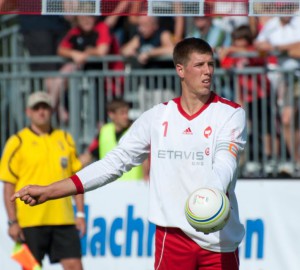
“Our big goal is to make it to the final”
The Swiss fistball prodigy, Cyrill Schreiber (32), a.k.a “Fausto,” is one of the best fistball players in the world. A few days ago he and his team from Widnau, Switzerland won the World Cup in Brazil. The World Cup is considered the most important competition for club teams. We reached Fausto on the phone, just after he stepped off the plane.
IFA: Hi Cyrill, you are just getting back from South America— how is your jet lag?
Cyrill Schreiber (Fausto): So far, so good. Mostly, I am still recovering from the World Cup, and trying to process what happened there.
IFA: Due to injuries, you couldn’t play much last year or during the first few games of the Swiss Field Championship. You recovered just in time to be ready for the World Cup. How are you feeling right now?
Fausto: I feel great. I had a lot of problems with my knee, but toward the end of the Swiss Field Championship, I started to slowly get back into the game, and by the time I got to South America, I had no more trouble playing.
IFA: Speaking of South America, you just came back from winning the World Cup for the fourth time. After winning it three times with Novo Hamburgo from Brazil, you now just won the World Cup with Windau, a Swiss team. How does it feel to win with a team from your own country?
Fausto: It is really something very special. In 2010, 2012 and 2013 I fought to win the Cup with Novo Hamburgo, but to win it now with a Swiss team is really special for me. It is the reward for all the hard work and dedication the Windau players and the entire team put into the last few years.
IFA: After a solid 4-0 performance in the first game of the World Cup, you were trailing behind 1-2 against Sogipa in the second game. How did you get back on the winning track?
Fausto: The team from Porto Alegre is a young, strong and tight team. They won the South American Cup, but they were still lacking the routine and confidence you need to win the World Cup. Against us, it was the fourth set of the second game, and they were in the lead 8-5, but they weren’t able to take the set home. The atmosphere had reached a boiling point. After we tied the score 2-2, it was over. Playing at home with a lot of fans was just too much pressure for Sogipa.
IFA: One of the big Swiss newspapers wrote a feature article about you and the World Cup victory. What does that mean for you?
Fausto: I thought it was great, and I am really proud that fistball is finally getting more attention from the national media. It is just a wonderful feeling if your story reaches 500,000 readers. Also, the Swiss TV accompanied our Widnau team for a few weeks during the Swiss Cup and aired a story on us during prime time. After that, people started recognizing me and talking to me on the street. It felt really special.
IFA: A Swiss TV station has also been filming the national fistball team during your preparation phase for the World Championship in Argentina. After the World Championship, they are planning on airing a long feature on the team. Does it bother you to have cameras everywhere while you practice?
Fausto: You get used to it! (laughs) I see it more as a sign of appreciation from the media and the public for our sport and the dedication of the players.
IFA: The World Championship starts in about two weeks. What do the last few days before big tournament look like?
Fausto: I‘m in the stage of weight training and cardio right now. After that, I will go to Turkey with the national team for four days for the finishing touches. Then, I go back for more fitness training in Switzerland, and after that we’re already heading to Argentina.
IFA: This will be World Championship number four for you. Have you had a chance to look at the game schedule yet? What do you think about the new system with a group phase first and a “double elimination” phase after that?
Fausto: We have talked about the schedule extensively during practice, and adjusted our strategy accordingly. There are going to be a lot of games. I am glad that, compared to previous World Championships, we finally have a lot of strikers on the team. This means that I don’t carry the sole responsibility on my shoulders any more, and it gives us a great vantage point for many strategic variations for the game. We want to make sure that we still have enough power and strength at the end.
IFA: Did you read any of the articles of the interview series “Road to Argentina”?
Fausto: No, not yet (laughs). I want to stay focused on the World Championship. Once everything is over, I’ll definitely catch up and read what was written beforehand. Now we have to make sure we focus on our performance on the field. What the other teams do is not that important to me at the moment.
IFA: There will be five newcomer teams that have never played in a World Championship before. What team are you the most curious about?
Fausto: I think it’s great for fistball that so many teams have registered for the World Championship. That’s the only way to move the game ahead in the long run. I am looking forward to all the teams. I am really excited to soon meet the players from the new teams, and a lot of new people in general.
IFA: After the painful loss in the quarter-finals against Argentina during the 2011 World Championship, Switzerland still has some unfinished business with this year’s host. Sure enough, in the second game of the group phase, the Swiss team will play against Argentina. Does that motivate you even more?
Fausto: We already got our revenge three years ago during the World Cup in Colombia! (laughs) I admire the Argentinian players, and I have also spent a lot of time with them during my South America trip. On the field however, we will get down to business. We definitely want to win.
IFA: Do you know how many World Championship medals Switzerland has won so far?
Fausto: Of course! Only two so far. During the World Championship of 1982 in Germany, Switzerland won bronze, and in 1995 in Namibia we won silver.
IFA: Do you think Switzerland could get another medal in Argentina?
Fausto: Our big goal is to make it to the final. We are very close as a team, and we really want to make it to the finals because it is a very special game where all this additional strength is set free. Obviously, a lot depends on how we feel each day, but everything is possible, we should make it to the final. I am also counting on our big and very enthusiastic fan base.
IFA: What are your plans after the World Championship? Play for a new team? Continue with the national team?
Fausto: I haven’t quite decided yet. I will think about this after the World Championship. Both decisions depend on so many factors. Nothing has been decided yet.
IFA: The next World Championship will be hosted by either the USA or Switzerland. Regardless of who ends up hosting the Championship, what are the chances that you will play again in four years, at age 36?
Fausto: I really don’t base my decision on where the World Championship will take place. Of course, it would be a very special feeling to represent Switzerland during a World Championship in my own country, but a World Championship in the US would also be a great experience. Whether I play again in four years depends on my motivation and my health, if I can find the motivation to go through the preparation phase again, and if I am fit enough. Should there be a younger player in my position that shows the same or a better performance, I would definitely give up my spot. So it all depends on the situation of the national team and how strong each position is. It is quite possible that I might play again, but I wouldn’t bet on it.
IFA: What about in two years from now, for the World Games in Poland. Will the coach still be able to count on you as a national player?
Fausto: I love playing the World Games. With so many different sports and countries represented there, it is always a very special atmosphere. As I said before though, I will decide all of that after the World Championship.
IFA: Thank you very much for your time. We wish you and the Swiss Fistball team the best of luck for the upcoming World Championship. We are all curious to see how your future plans in sports will turn out. We would definitely like to see you play in international competitions for many more years.
————————————-
DEUTSCH
„Unser Ziel ist der Final“
Das Schweizer Faustball Ausnahmetalent, Cyrill Schreiber (32), genannt „Fausto“ gehört zu den besten Faustballern der Welt. Vor wenigen Tagen hat er den Weltpokal, den wichtigsten Wettbewerb für Vereinsmannschaften mit Widnau (CH) gewonnen. Wir konnten ihn telefonisch zu Hause in Walzenhausen erreichen.
IFA: Hallo Cyrill, gerade zurück aus Südamerika, wie geht es mit dem Jetlag?
Cyrill Schreiber genannt Fausto: Gut soweit. Ich bin am Regenerieren und immer noch daran das Erlebte zu verarbeiten.
IFA: Letztes Jahr und auch zu Beginn der Schweizer Feldmeisterschaft musstest Du verletzungsbedingt auf viele Einsätze verzichten. Wie geht es Dir?
Fausto: Mir geht es Gesundheitlich gut. Das Knie war meine Problemzone. Aber in der Schlussphase der Meisterschaft konnte ich wieder ins Spielgeschehen eingreifen und in Südamerika hatte ich keine Beschwerden.
IFA: Du hast gerade zum 4. Mal den Weltpokal, die höchste Auszeichnung für Vereinsmannschaften gewonnen. Nach drei Titelgewinnen mit Novo Hamburgo aus Brasilien nun das erste Mal mit Windau. Wie fühlt sich das an?
Fausto: Das ist was ganz spezielles. Den Pokal 2010, 2012 und 2013 hatte ich für Novo Hamburgo erkämpft. Aber jetzt mit einem Schweizer Verein – das ist etwas ganz besonderes. Es ist der Lohn für die harte Arbeit und den grossen Einsatz den alle Verantwortlichen und Spieler von Widnau über die letzten Jahre geleistet haben.
IFA: Nach einer souveränen 4:0 Leistung im ersten Spiel des Weltpokals hieß es am zweiten Spieltag zwischenzeitlich 1:2 für Sogipa. Wie habt Ihr auf die Siegerstrasse zurückgefunden?
Fausto: Das Team aus Porto Alegre ist eine junge, spielstarke und kompakte Mannschaft. Sie hatten den Südamerika-Pokal gewonnen, aber für den Weltpokal fehlte ihnen noch die Routine und Abgeklärtheit. Im zweiten Spiel im 4. Satz lagen Sie 8:5 voraus, konnten den Satz aber nicht ins trockene bringen. Nach dem 2:2 war es dann gelaufen. Es war ein echter Hexenkessel nicht nur für uns. Auf den Spielern von Sogipa lag ein grosser Druck. Sie spielten im heimischen Stadion und vor einem fanatischen Heimpublikum.
IFA: Eine der grossen Schweizer Tageszeitungen hat einen Bericht über dich und den Gewinn des Weltpokals gebracht. Was bedeutet dir das?
Fausto: Ich finde es super und bin sehr stolz, dass der Faustballsport nun endlich auch die Beachtung in überregionalen Medien bekommt. Es ist schon toll, wenn deine Geschichte in einer Zeitung mit 500‘000 Lesern erscheint.
Auch das Schweizer Fernsehen hatte Widnau vor einigen Wochen anlässlich des Schweizer Cups begleitet und einen mehrminütigen Bericht zur besten Sendezeit gebracht. Ich wurde dann auf der Straße erkannt von vielen Leuten angesprochen. Das ist schon etwas Spezielles.
IFA: Die ganze Vorbereitungsphase der Schweizer Männermannschaft auf dem Weg nach Argentinien wird vom Schweizer Fernsehen begleitet und nach der WM wird ein längerer Bericht gesendet werden. Stört es, dass bei den Trainings Kameras dabei sind?
Fausto: Daran gewöhnt man sich (lacht). Ich empfinde es vor allem als Anerkennung der Medien und des Publikums für den Faustballsports und den Einsatz von uns Nationalspieler.
IFA: In wenigen Tagen beginnt die WM, wie sehen die letzten Vorbereitungstage aus?
Fausto: Ich bin im Zwischenaufbau-Training mit viel Kraft und Ausdauereinheiten. Und dann gehe ich mit der Nationalmannschaft noch vier Tage in die Türkei um den letzten Schliff zu holen. Zurück in der Schweiz nochmals Fitness und dann geht es auch schon nach Argentinien.
IFA: Das ist nun deine vierte WM-Teilnahmen. Hast Du dich schon mit dem Spielplan auseinandergesetzt? Was hältst Du vom speziellen Modus mit der Gruppenphase und dann dem „Double Elimination System?“
Fausto: Wir haben in anlässlich des Nationalmannschafts-Trainings den Spielplan ausführlich besprochen und unser Taktik und Strategie bereitgelegt. Es wird auf jeden Fall viele Spiele geben. Ich freue mich, dass wir auch im Angriff, gegenüber früheren Weltmeisterschaften, nun ein breites Kader haben und die Verantwortung nicht nur auf meinen Schultern liegt. Das ist eine tolle Ausgangslage und gibt uns die Möglichkeit für viele taktische Varianten. Ziel ist es, die größten Kräfte am Schluss noch mobilisieren zu können.
IFA: Hast Du die bisherigen Interviews der Serie „Road to Argentina“ gelesen?
Fausto: Nein, habe ich nicht (lacht). Ich bereite mich fokussiert auf die WM vor. Wenn alles vorbei ist werde ich sicher auch nachlesen was alles im Vorfeld geschrieben wurde. Wir müssen die Leistung auf dem Platz erbringen. Was die anderen Mannschaften planen interessiert mich nur am Rande.
IFA: Fünf Nationalmannschaften sind erstmals an der Weltmeisterschaft dabei. Auf welches Team bist du besonders gespannt?
Fausto: Ich finde es super für den Faustballsport, dass sich so viele Mannschaften für die WM gemeldet haben. Nur so kann sich der Faustballsport auf die Dauer weiterentwickeln. Ich freue mich auf alle Teams! Ich bin gespannt, schon bald die Spieler aus den neuen Nationen kennenzulernen und viele Kontakte zu knüpfen.
IFA: Nach der schmerzlichen Viertelfinal-Niederlage gegen Argentinien an der WM 2011 hat die Schweiz mit dem Gastgeber noch eine Rechnung offen. Im zweiten WM-Gruppenspiel trifft das Swiss Team auf Argentinien. Bist Du da besonders motiviert?
Fausto: (lacht) Revanche haben wir bereits anlässlich der World Games vor 3 Jahren in Kolumbien genommen! Ich schätze die Spieler aus Argentinien sehr und habe auch schon drei Wochen mit Ihnen auf einer meiner Südamerika-Reisen verbracht. Aber auf dem Spielfeld geht’s zur Sache. Da wollen wir wieder vorlegen.
IFA: Weißt Du wie viele WM Medaillen die Schweiz bisher gewonnen hat?
Fausto: Natürlich, erst zwei Medaillen. An der WM in Deutschland 1982 gab es Bronze und 1995 in Namibia eine Silber-Medaille.
IFA: Liegt in Argentinien wieder einmal eine Medaille für die Schweiz drin?
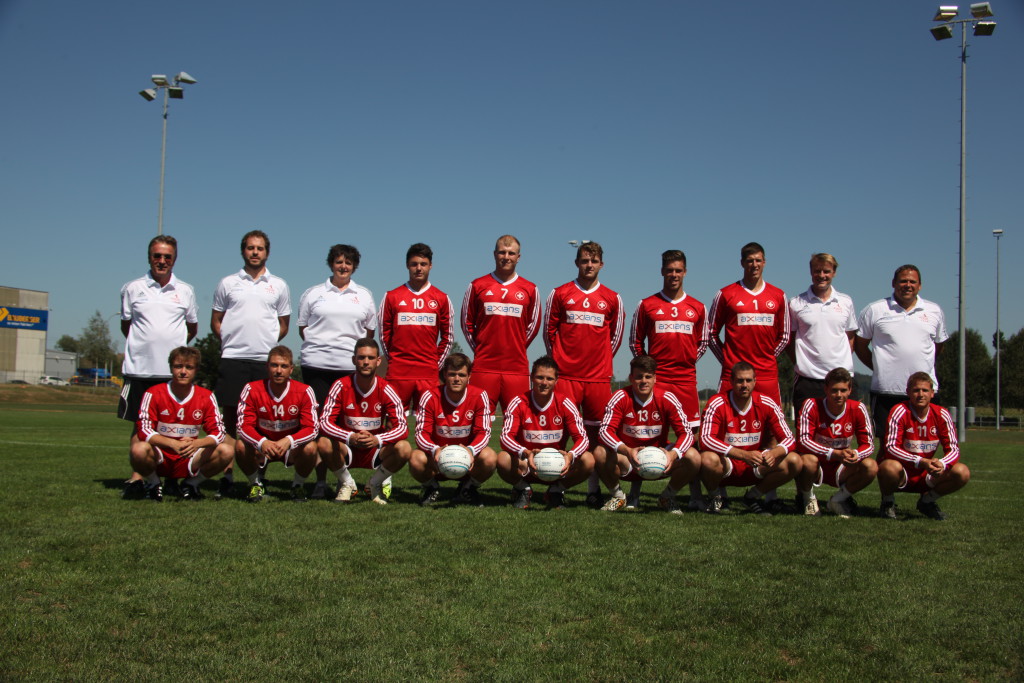
Fausto: Unser großes Ziel ist es in den Final zu kommen. Wir sind eine eingeschworene Truppe und werden alles Versuchen um im Final dabei zu sein. Ein Final ist ein besonderes Spiel, das nochmals viele Kräfte freisetzen kann. Die Tagesform spielt sicher auch eine große Rolle – alles ist möglich – sollten wir es ins Endspiel schaffen. Auf jeden Fall zähle ich wieder auf unsere große und lautstarke Fangruppe!
IFA: Wie sehen deine sportlichen Pläne nach der WM aus? Vereinswechsel? Weitermachen in der Nationalmannschaft?
Fausto: Ich habe mich noch nicht entschieden. Das passiert nach der WM. Es hängt von verschiedenen Faktoren ab. Dies gilt für die Entscheide auf Vereins- aber auch auf Nationalmannschaftsebene. Da ist noch alles offen.
IFA: Für die Austragung der nächsten WM 2019 sind die USA und die Schweiz die aussichtsreichsten Kandidaten als Gastgeber. Wie stehen die Chancen, dass Du in vier Jahren mit 36 nochmals zur Verfügung stehen wirst, egal ob die USA oder die Schweiz den Zuschlag bekommt?
Fausto: Ich mache meine Entscheidung nicht davon abhängig, wo die WM stattfindet. Es ist sicher etwas ganz Besonderes die Schweizer Farben im eigenen Land an einer Weltmeisterschaft vertreten zu dürfen, aber auch eine WM in der USA wäre ein tolles Erlebnis. Es kommt drauf an, ob ich nochmals die Motivation finde die harte Vorbereitungsphase mitzumachen und natürlich wie es mir gesundheitlich geht. Sollte ein junger Spieler da sein, der auf meiner Position die gleiche oder bessere Leistung bringt, räume ich selbstverständlich meinen Platz. Es ist sicher abhängig, wie es dann um die Nationalmannschaft steht und wie stark sie auf allen Positionen ist. Es ist durchaus möglich, dass ich nochmals dabei bin, ich würde es aber heute noch nicht unterschreiben.
IFA: Und in zwei Jahren an den World Games in Polen, stehst Du da dem Nationaltrainer noch zur Verfügung?
Fausto: Die World Games sind immer ein super Erlebnis. Da sind viele Sportarten und Nationen vertreten und es herrscht eine tolle Atmosphäre. Wie bereits gesagt, ich entscheide erst nach der WM.
IFA: Vielen Dank, dass Du kurz Zeit hattest. Wir wünschen dir und dem Team von SwissFaustball viel Glück an der WM. Die Faustballwelt ist gespannt, wie deine weiteren sportlichen Ziele aussehen werden. Wir würden uns freuen, dich noch viele Jahre an internationalen Wettkämpfen sehen zu können.
Road to Argentina – Part/Parte/Teil 10 – Interview mit Alvaro Mödinger – Team Chile, Spiker/Angreifer
ENGLISH VERSION BELOW
VERSIÓN ESPAÑOLA ABAJO
Interview mit Alvaro Mödinger – Spiker/Angreifer, Chile
„Jetzt ist es Zeit die langjährige Arbeit mit Erfolgen zu belohnen.“
Zum bereits vierten Mal steift Alvaro Mödinger das chilenische Nationaltrikot bei einer WM über. Der 27-jährige Wirtschaftsingenieur konnte bereits Erfahrungen in der Österreichischen Bundesliga sammeln und mit Chile den 5. Platz bei den World Games 2013 erreichen. Er spricht mit uns über den Aufwärtstrend im internationalen Faustball und was die chilenischen Faustballer mit ihren Fußballkollegen gemeinsam haben, die dieses Jahr den Südamerikapokal gewinnen konnten.
IFA: Hallo Alvaro, in weniger als einem Monat beginnt die WM in Argentinien. Wie gut vorbereitet ist das Team aus Chile?
Alvaro Mödinger: Für diese WM haben wir uns sehr gut vorbereitet, wir sind älter geworden und wir haben mehr internationale Erfahrung. Seitdem Christian Dähling in Jahr 2003 als Nationaltrainer eingestiegen ist, hat sich in unserem Team sehr viel verbessert und wir haben nun drei starke Faustballgenerationen in Folge gehabt. Jetzt ist es Zeit die langjährige Arbeit mit Erfolgen zu belohnen. Seit Mai trainieren wir zwischen 3-4 mal pro Woche und verbringen dabei auch viel Zeit im Fitnessraum. Wir verstehen uns privat alle sehr gut, wir sind Freunde, feiern zusammen und spielen sogar gemeinsam noch Fußball bei unserem Verein. Dieser starke Zusammenhalt wird uns bei der WM helfen.
IFA: Ihr habt euch in den vergangenen Jahren immer mehr in der Weltspitze etabliert und bei der WM 2011 den tollen 6. Platz, bei den World Games 2013 dann sogar den 5. Rang erreicht . Wie sehen eure Ziele für die kommende Weltmeisterschaft aus?
Alvaro: Obwohl wir bei den beiden angesprochenen Turnieren eine schlechte Vorrunde gespielt haben, konnten wir im weiteren Verlauf unser Niveau erhöhen und jeweils ausgezeichnete Resultate erzielen. Für uns ist es in erster Linie wichtige unseren Aufwärtstrend zu bestätigen und uns für die World Games 2017 qualifizieren. Unser Traum wäre es das Halbfinale zu erreichen.
IFA: Beim Fußball konnte Chile die Außenseiterrolle nutzen und sich überraschend den Südamerikatitel holen. Ist dem Faustballteam bei der WM eine ähnliche Sensation zuzutrauen?
Alvaro: Auch unsere Fußball Nationalmannschaft ist eine zusammengeschweißte Truppe die mit Stolz das chilenische Trikot trägt und am Spielfeld alles gibt – wie wir Faustballer. Bei den letzten internationalen Wettkämpfen haben wir immer bessere Platzierungen erreicht, mal sehen wohin das noch führen kann.
IFA: Wie sieht es mit dem Spielbetrieb in Chile aus, tut sich auch im Nachwuchsbereich etwas?
Alvaro: In den letzten Jahren hat sich die chilenische Faustball-Liga stark verbessert und vergrößert, im Durchschnitt spielen jetzt 18 Mannschaften pro Turnier. Insgesamt sind rund 200 Spieler im Land aus drei Städten (Llanquihue, Los Ángeles und Santiago de Chile) aktiv dabei. Im Jugendbereich haben wir derzeit 6 Mannschaften, vor allem das Engagement von den Vereinen und Trainern, wie Saulo Zanlorenzi (Trainer aus Brasilien), hat in den letzten Jahren im ganzen Land für einen kräftigen Schub im Nachwuchsbereich gesorgt.
IFA: Direkt nach der WM steht dann in Chile die nächste IFA Großveranstaltung an – die Seniorenweltspiele (26-29. November). Wie laufen die Vorbereitungen für dieses Event?
Alvaro: Es wird ein großartiges Weltklasse-Turnier sein, das im Vorhinein aber viel Arbeit mit sich bringt. Mein Vater, Hernán „Nancho“ Mödinger, arbeitet mit dem Organisationskomitee intensiv zusammen, um allen ein schönes Turnier bieten zu können. Der Club Gimnástico Alemán in Llanquihue hat viel Erfahrung in die Organitation von solchen Events (Herren-WM 1992, Senioren-WM 2000 und Jugend-WM 2006). Ich werde sicherlich an beiden Tagen vor Ort sein um das Faustballfest zu genießen.
IFA: Du hast in Österreich einige Saisonen für Laakirchen in der 1. Bundesliga gespielt. Was sind für dich die größten Unterschiede im Vergleich zum Wettkampf in Chile?
Alvaro: Ich wollte seit 2009 in Europa spielen, geklappt hat es dann erst nach dem Abschluss meines Ingenieurstudiums. Mit dem Einsatz bei Laakirchen in Österreich ist wirklich ein Traum für mich in Erfüllung gegangen. Der größte Unterschied zwischen Chile und Österreich ist die Regelmäßigkeit der Meisterschaftstermine. Hier in Chile gibt es ein Turnier alle 2-3 Monate und in Österreich spielst du fast jedes Wochenende gegen die besten Teams des Landes.
IFA: Wie stehen die Chancen, dass wir dich bald wieder in der österreichischen Liga zu spielen sehen?
Alvaro: Ich schließe es nicht aus wieder nach Europa zu kommen, aber wenn dann würde ich es mit einem beruflichen Teil ergänzen. Ich habe sehr viele gute Erinnerungen an meine Zeit in Laakirchen, das war wohl einer meiner schönsten Lebensabschnitte. Ich bleibe auf jeden Fall weiter in Kontakt mit Trainer Ernst Almhofer, vielleicht klappt es ja eines Tages wieder.
IFA: Was erwartest du dir von der Veranstaltung in Südamerika nach zwei Weltmeisterschaften in Europa (Deutschland 2007 und Österreich 2011)?
Alvaro: Ich glaube, es wird eine sehr spannende WM sein, mit temperamentvoller südamerikanischer Atmosphäre. Die Ausrichter in Argentinien sind schon seit Jahren dabei das Event zu organisieren und ich glaube es wird von Erfolg gekrönt sein. Hoffentlich sind auch viele Zuschauer vor Ort, es ist ja immerhin der größte und wichtigste Bewerb im Faustballsport, das sollten sich die Leute nicht entgehen lassen.
Interview: Valentin Weber, Austria
===============
VERSIÓN ESPAÑOLA:
Camino a Argentina – Parte 10
Entrevista con Álvaro Mödinger – Sacador/Remachador, Chile
ENGLISH VERSION BELOW
„Es momento de retribuir los muchos años de trabajo con logros”
Por cuarta vez, llevará Álvaro Mödinger la camiseta de la Selección Nacional en un Mundial de Faustball. El ingeniero Civil Industrial de 27 años con experiencia de juego en la Liga Austríaca, logró junto al equipo chileno el 5to puesto en los Juegos Mundiales (Worldgames). El conversa con nosotros acerca de la tendencia al alza del Faustball internacional y de la situación particular de los faustballistas chilenos poseen, quienes fueron campeones sudamericanos en los años 2012 y 2014.
IFA: Hola Álvaro, en menos de un mes comienza el Mundial en Argentina. Qué tan bien se han preparado el equipo chileno?
Álvaro Mödinger: Para este Mundial nos hemos preparado bien, estamos más maduros y con mayor experiencia internacional. Desde que asumió Christian Dähling como entrenador de la Selección Chilena en el año 2003, ha mejorado mucho nuestro equipo y hemos tenido ya tres buenas generaciones de jugadores. Ahora es el momento de retribuir los muchos años de trabajo con logros. Desde mayo estamos entrenando entre 3 a 4 veces por semana y horas en el gimnasio. También el equipo está muy afianzado, somos todos amigos, festejamos juntos y jugamos además futbol en la Liga de nuestro Club. Esa fuerte cohesión grupal será de gran ayuda en el mundial.
IFA: Ustedes han demostrado en los últimos años cada vez más que están a la élite mundial del Faustball, alcanzando el 6to lugar en el Mundial 2011 e incluso el 5to lugar en los Worldgames 2013. Cómo ven las metas para el próximo Mundial?
Álvaro: A pesar de no comenzar muy bien ambos campeonatos, pudimos mejorar nuestro rendimiento a medida que fueron avanzando los torneos, obteniendo finalmente buenos resultados. Para nosotros es importante poder mantener nuestro nivel de juego y clasificar a los Worldgames 2017. Nuestro sueño es poder alcanzar las semifinales del Mundial.
IFA: En el fútbol, Chile logró ocupar un rol fuera de serie y sorpresivamente ser campeones sudamericanos. Posee el equipo de Faustball una sensación similar?
Álvaro: Al igual que nosotros, nuestra selección de fútbol, ha creado un grupo de jugadores unidos que visten orgullosamente la “Roja” y lo dejan todo en la cancha. En los últimos campeonatos internacionales hemos logrado obtener mejores lugares, hay que ver hasta dónde podemos llegar.
IFA: Cómo se ve la gestión del Faustball en Chile, se está trabajando con divisiones inferiores?
Álvaro: En los últimos años nuestra Liga ha crecido y ha mejorado considerablemente su nivel, en promedio participan 18 equipos por torneo. En total somos aproximadamente 200 jugadores activos en Chile, proveniente de tres ciudades (Llanquihue, Los Ángeles y Santiago). En categorías inferiores tenemos en la actualidad 6 equipos, las cuales gracias al compromiso de los clubes y entrenadores en los últimos años como Saulo Zanlorenzi (Entrenador brasileño), han impulsado el crecimiento de esta categoría.
IFA: Inmediatamente después del Mundial Adulto, se realizará el próximo gran evento de la IFA – El Mundial Senior (26 al 29 De noviembre). ¿Cómo van los preparativos de este evento?
Álvaro: Será un gran torneo de clase mundial, pero viene acompañado de un gran trabajo. Mi padre, Hernán “Nancho” Mödinger, está trabajando intensamente junto al comité organizador para poder ofrecer un lindo torneo. El Club Gimnástico Alemán de Llanquihue posee larga experiencia en la organización de este tipo de eventos (por ejemplo Mundial Adulto Varones 1992, Mundial Seniors 2000 y Mundial Juvenil 2006). De seguro voy a estar allá durante ese fin de semana para poder disfrutar de esta fiesta del Faustball.
IFA: Jugaste una temporada con el equipo de Laakirchen en la 1era División austríaca. ¿Cuáles son para ti las mayores diferencias con la competencia chilena?
Álvaro: Desde el año 2009 que quería jugar en Europa, pero resultó recién cuando logré terminar mis estudios de ingeniería. Haber jugado en Laakirchen fue para mí un sueño hecho realidad. La mayor diferencia entre Chile y Austria es la regularidad de los partidos/campeonatos. Acá en Chile tenemos campeonatos cada 2 a 3 meses y en Austria juegas prácticamente todos los fines de semana contra los mejores equipos del país.
IFA: Cuáles son las chances de volver a verte en la Liga austríaca?
Álvaro: No cierro las puertas para volver a Europa, pero sería con prioridades profesionales. Tengo muy buenos recuerdos de Laakirchen, fue una etapa muy linda de mi vida. Por su puesto sigo en contacto con mi entrenador de allá, Ernst Almhofer, a lo mejor resulta algún día.
IFA: Qué esperas tú, luego de que los dos últimos mundiales se realizaron en Europa, se realice nuevamente en Sudamérica?
Álvaro: Creo que va a ser muy emocionante, con el ánimo y ambiente sudamericano. Los organizadores argentinos llevan organizando el evento por años y creo va a ser un éxito. Espero también hayan muchos espectadores ya que es, después de todo, la mayor y más importante competencia de nuestro deporte y la gente no puede dejar pasar esta oportunidad de asistir.
===============
ENGLISH VERSION
Road to Argentina – Part 10
Interview with Alvaro Mödinger – Striker, Chile
“Now is the time to reap the fruits of our labour.”
Chilean striker Alvaro Mödinger is looking forward to his fourth World Cup appearance. The 27-year-old industrial engineer has already played in the Austrian league for two years and also reached the 5th place with Chile at the World Games 2013. He talks about the upward tendency of Chilean fistball and what the fistball team has in common with the soccer national squad, who won the Copa America this year.
IFA: In less than a month the World Championship in Argentina starts. How well prepared is the team from Chile?
Alvaro Mödinger: For this World Championship we prepared very well, we are growing older and have more international experience. Since Christian Dähling entered the federation as head coach in 2003, we improved a lot and had three generations of fistball players that are competing on a high level. Now is the time to reap the fruits of our labour. For the last five months we were training 3-4 times a week and spent quite a lot of time in the gym. We are friends on and off the field, we are playing together, partying together and even play soccer in our club as well. This strong team spirit will help us at the World Cup.
IFA: In the last couple of years the Chilean team stunned the fistball world with good results (6th at the WC 2011 and 5th at the World Games 2013). What are the goals for the upcoming World Championship?
Alvaro: We started bad in the preliminary round at the last international tournaments, nevertheless we could improve our playing level throughout the tournament and that’s why we reached that good results. For us it’s important to verify our chances to win against world class teams and coming along with that we want to qualify for the World Games 2017. Our dream would be to reach the semi-final.
IFA: The Chilean soccer team surprised everybody at the Copa America, where they became Champions of South America. Do you think this sensation could also take place in fistball?
Alvaro: Our soccer team has a strong fighting spirit and the players are proud to wear the Chilean jersey and give everything they have when they are on the pitch – just like we do. We continued to improve our results, so we will see where this will take us.
IFA: What about the fistball in Chile? How many people are playing and do you have a league system and junior teams?
Alvaro: Over the last four years the playing level and the number of teams increased. We have large tournaments where at least 18 teams are competing for the title and one final event. Altogether we have about 200 active players in three cities (Llanquihue, Los Ángeles and Santiago de Chile). There is also a lot going on in the youth sector, kudos to the clubs and coaches like Mr. Saulo Zanlorenzi (coach from Brazil) who made it possible to establish youth championships in the country.
IFA: Shortly after the World Championship in Argentina the next big international fistball event is going to happen in Chile. The Masters World Cup for will be held in Llanquihue from 26th-29th of November. Are the preparations for the event in time?
Alvaro: It’s going to be a world-class tournament for sure. There is still a lot of work to do, but my father, Hernán “Nancho” Mödinger, and the OC are doing their best to host a good event. The Club Gimnástico Alemán in Llanquihue has already experience with big fistball tournaments as they hosted the Men’s World Championship 1992, the Masters World Cup 2000 and the Youth World Cup in 2006. I’m going to be there to watch good
fistball games and enjoy the atmosphere of the event.
IFA: You played for Laakirchen in the Austrian league for two seasons. What are the biggest differences between fistball in Austria and fistball in Chile?
Alvaro: It was always my dream to play in Europe and after I finished my university degree this dream came true. While, in Chile we are playing tournaments every 2-3 months, in Austria you can play against the best teams of the country almost every weekend.
IFA: How big are the chances to see you in the Austrian league again?
Alvaro: It’s definitely possible, but if I come back I would connect my stay with work-related issues. There are a lot of great memories of my time in Laakirchen, it was one of my best experiences in my life so far. Of course I’m still in contact with Laakirchen coach Ernst Almhofer and maybe one day I’ll be back again.
IFA: What do you expect of the World Championship in South America after two terrific events in Europe (Germany 2007 and Austria 2011)?
Alvaro: I think it’s going to be a tough high-level competition with South American atmosphere. The host federation of Argentina has been working hard for the last year to organise a world-class event. I hope the local people use their chance to view the best fistball teams of the world in their country. It’s the Men’s World Championship, the biggest international fistball event, they shouldn’t miss out on that.
Interview: Valentin Weber, Austria
Road to Argentina – Part/Teil 8 – Team USA, Gastão Englert, Head Coach/Trainer
ENGLISH VERSION BELOW
Picture Copyright Manfred Lindorfer
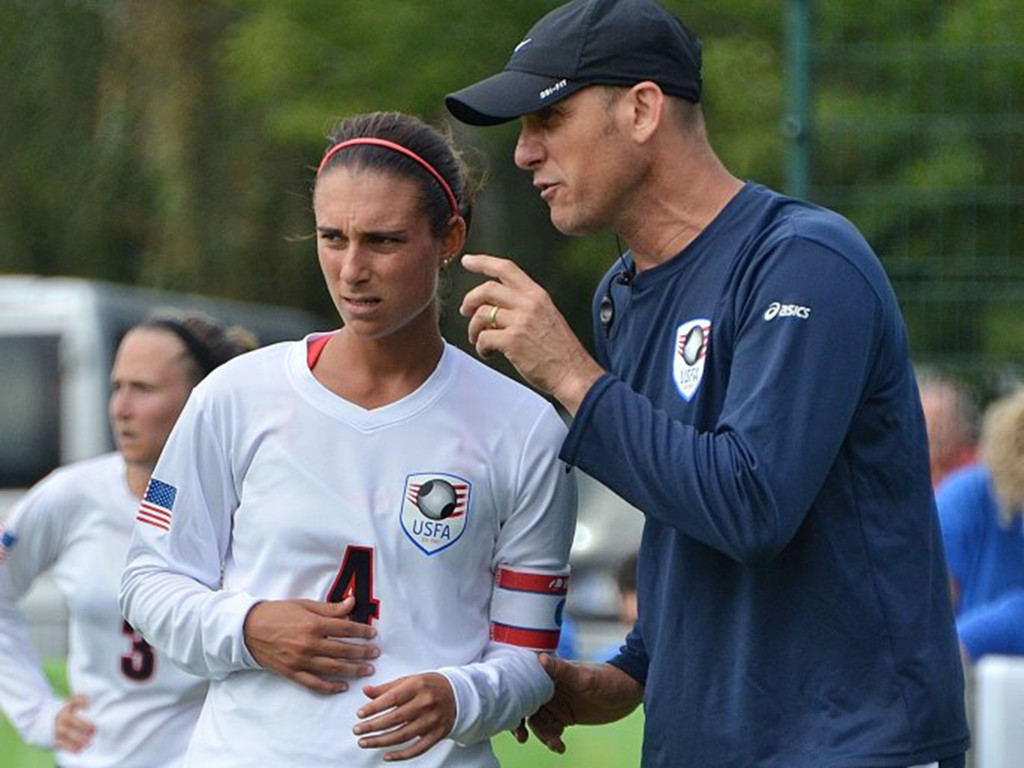
„Ich spreche nicht von konkreten Zielen, ich spreche von Träumen.“
Der brasilianische “Botschafter des Faustballsports“, wie Gastão Englert (49) auf der Homepage des US-Verbands genannt wird, ist einer der erfolgreichsten Trainer in der Faustballgeschichte. Er konnte als Trainer mit der brasilianischen Nationalmannschaft drei WM-Titel gewinnen – 2x mit den Herren (1999, 2003) und 1x mit den Damen (2010). Seit 2011 zeichnet er sich für den Aufschwung im amerikanischen Faustball mitverantwortlich. Er erzählt uns warum er nach 14 Jahren in Brasilien zum US-Verband gewechselt hat und warum es wichtig ist die besten Teams der Welt in die “Staaten” zu holen.
IFA: Hallo Gastão, auf den ersten Blick erscheint es schon etwas ungewöhnlich, dass ein Brasilianer die Faustballnationalmannschaft der USA trainiert. Wie ist es denn dazu gekommen?
Gastão Englert: Naja, bei der Weltmeisterschaft 2007 hatte ich zum ersten Mal Kontakt mit den Amerikanern. Sie haben mich beim Training beobachtet und dann gesagt: „Uns gefällt deine Art das Training zu leiten. Wie viel würde es kosten, dass du einmal in die USA kommst und uns Faustballtipps zu geben?“. Ich habe dann entgegnet: „Bitte was? (lacht) Das kostet gar nichts, ihr bezahlt mir das Flugticket und dann komme ich während meinem Urlaub zu euch.“ Sie waren sehr überrascht über meine Antwort. Im Januar 2011 war es dann soweit und ich blieb für zwei Wochen dort, wir haben viel trainiert und Ziele vereinbart. In diesen zwei Wochen habe ich förmlich gespürt, wie die Motivation bei jedem einzelnen Spieler immer größer wurde.
IFA: Die Motivation war also vorhanden, sie benötigten nur einen Profi um ihnen zu zeigen wie man sich faustballtechnisch gezielt verbessern kann?
Gastão: Ja genau, jeder war mit Leidenschaft dabei um die aufgestellten Ziele zu erreichen. Ein halbes Jahr später bin ich dann gleich für ein ganzes Monat in die USA geflogen um die weitere Trainingseinheiten abzuhalten. Bei den Weltmeisterschaften im Sommer 2011 hat man dann gesehen, dass die gesamte Mannschaft um Längen besser war als im Jahr 2007.
IFA: Aber bei der Weltmeisterschaft warst du noch für Brasilien als Cheftrainer tätig?
Gastão: Genau, das war mein letzter internationaler Auftritt für Brasilien. Ich habe als Nationaltrainer der Damen und Herren für ganze 14 Jahre gearbeitet und alles gewonnen, was es zu gewinnen gibt – Weltmeisterschaften, World Games und Südamerika Meisterschaften – ich hatte genug von Faustball zu diesem Zeitpunkt, daher bin ich vom Nationalteam zurückgetreten. Meine Motivation für die Arbeit im Faustballsport war sehr sehr gering damals. Ich habe mir oft gedacht: „Ich muss jetzt etwas finden das mir einen Grund gibt weiterzumachen.“ Es mag verrückt klingen, aber um einen WM-Titel zu kämpfen war für mich keine Challenge mehr, es hat mir nichts mehr gegeben.
IFA: Dann war die Tür also offen für den US-Verband?
Gastão: Ein halbes Jahr nach der WM in Österreich habe ich wieder einen Anruf aus den USA erhalten und ich wurde eingeladen weitere Trainings vor Ort zu leiten. Dann ist es mir in den Kopf geschossen: „Diese Aufgabe ist vielleicht genau das was ich gesucht habe.“. Der Weg zu einer Zusammenarbeit bis zur Weltmeisterschaft 2015 war geebnet. In den vergangenen drei Jahren war ich nun zwei Mal pro Jahr für zwei Wochen in Amerika. Ich habe intensive Trainingseinheiten gemacht, neue Ziele und Strategien entwickelt, sowie die Trainer instruiert wie sie zu arbeiten haben, wenn ich nicht da bin. Das funktioniert hervorragend und immer wenn ich wieder komme sehe ich einen großen sportlichen Fortschritt, das finde ich großartig.
IFA: Das Langzeitziel deines Engagements war bzw. ist die WM 2015, wirst du danach auch als Trainer des US-Teams zurücktreten?
Gastão: Das ist eine gute Frage. (lacht) Wir sprechen bereits über den nächsten Schritt und ich fühle mich von den Burschen in meiner Arbeit bestätigt. Ich kann mich wirklich mit allem, was hier im Verband passiert, identifizieren. Immer wenn ich in die USA komme ist jeder glücklich und freundlich, es fühlt sich für mich schon wie Heimat an. Die ganze Gruppe war der Grund, dass ich meine Arbeit im Faustball fortgesetzt habe und meine aktuelle Motivation dort weiterzuarbeiten ist sehr hoch. Nun spielt mein Team nicht mehr um den Titel, aber das ist auch nicht der Anspruch für mich, es sind andere Dinge, die für mich wichtig sind. Unser Ziel ist es nicht, die besten Mannschaften der Welt zu schlagen, wir müssen uns auf uns selbst konzentrieren und sicherstellen, dass wir unsere bestmögliche Arbeit leisten – an jedem einzelnen Tag.
IFA: In Österreich 2011 belegten die USA Rang 9, was ist das Ziel für die Weltmeisterschaft 2015 in Argentinien?
Gastão: Was ich mit Sicherheit sagen kann ist, dass wir dieses Mal viel besser sein werden als noch vor vier Jahren. Wir wissen aber auch, dass die anderen Nationen ebenfalls fleißig trainiert haben, unser Job ist es den perfekten Punkt in jeder Situation zu spielen. Das bedeutet immer 100 Prozent zu geben und jede Spielsituation bestmöglich zu bewältigen. Einen großen Nachteil haben wir: es fehlen uns hier die hochklassigen Gegner im Umkreis, wir spielen immer nur gegen dieselben Leute. Ich habe mich daher ins Zeug gelegt um Top-Spieler und Teams nach Amerika zu bringen. Das Resultat dieser Anstrengung waren dann die ersten Pan American Fistball Spieler in New Jersey, dieses Jahr im August. Ich wollte einfach mit dem „Gesellschafts-Faustball“ brechen, bei dem sich Leute einfach nur treffen um Spaß zu haben und dann gemeinsam Bier trinken. Es gibt auch eine andere Seite, wenn man international aktiv wird, bekommt man eine Vorstellung davon, was man alles erreichen kann. Wir spielen nun auf internationalem Level und möchten auch regelmäßig Turniere ausrichten, wir sind auf einem guten Weg.
IFA: Kommen wir noch einmal zurück zu den PanAmerican Games (27. – 31.August). Wie hast du das erste internationale Faustballevent auf amerikanischem Boden erlebt? Wie waren deine Eindrücke?
Gastão: Wir wollten einfach mal die internationale Faustballelite ins Land holen und Menschen in der Umgebung dazu motivieren sich mehr mit dem Sport auseinanderzusetzten – dieses Ziel haben wir zu 100 Prozent erreicht. Mit solchen Events lockst du auch hochrangige Vertreter aus der Politik und Sponsoren auf den Sportplatz, das ist sehr wichtig. Der Bürgermeister von Flanders war von der Veranstaltung so angetan, dass er gleich an zwei Tagen die Faustballaction mitverfolgte. Das hohe Niveau, die Gespräche und Trainings mit den Sportlern aus den verschiedensten Ländern, das alles waren kleine Bausteine, die das Turnier so erfolgreich gemacht haben.
IFA: Der amerikanische Verband hat große Ziele, für die WM 2019 hat man sich als Ausrichter beworben. Mit der Schweiz hat man einen WM-erfahrenen Konkurrenten, was ist deine Meinung zur Vergabe der nächsten WM?
Gastão: Es ist eine tolle Herausforderung für uns. Es hat alles mit scherzhaften Gesprächen mit meinen Spielern begonnen. Ich habe gesagt: „Hey Leute, wie wäre es wenn wir eine WM in Disneyworld zu organisieren. Alle würden ihre Familie mitbringen und wir bringen die größte Zuschauerkulisse, die der Faustballsport jemals gesehen hat in die USA.“ Aber jetzt im Ernst, die Herren Faustball Weltmeisterschaft ist ein ganz anderes Kaliber als die Pan American Games, dieses Event kann nicht mit ein paar Vereinsmitgliedern durchgeführt werden. Wenn wir die WM ausrichten, dann soll es die beste Weltmeisterschaft werden die es bis zu diesem Zeitpunkt gegeben hat. Man muss Träume haben und ich denke es ist möglich.
IFA: Du hast bereits gesagt, dass du von deinen Spielern den perfekten Punkt in jeder Situation forderst. Was ist deiner Meinung nach das bestmögliche Ergebnis, das das US-amerikanische Team erreichen kann?
Gastão: Es ist nicht einfach diese Frage mit einer konkreten Platzierung zu beantworten. Ich sage meinen Spielern immer: „Das Ergebnis ist nicht das Produkt, sondern das Ergebnis ist die Konsequenz aus eurem Training.“ Alle anderen Teams haben auch hart trainiert, also spreche ich nicht von konkreten Zielen sondern nur von unseren Träumen. Wir wollen 2017 bei den World Games in Polen teilnehmen, dafür müssen wir mindestens Sechster werden, das ist unser Traum. Es wird sehr schwer werden diese Platzierung zu erreichen, aber man wird doch wohl noch träumen dürfen. (lacht)
IFA: Danke für das Interview Gastão, wir wünschen dir und dem US-Team viel Glück für die WM in Argentinien.
Interview: Valentin Weber, Austria
===============
ENGLISH VERSION
“I’m not talking about goals, I’m talking about dreams.”
The Brazilian “ambassador of fistball” Gastão Englert (49) is one of the most successful coaches in fistball history. He won the World Championship three times as Brazilian coach – 2x Men’s title (1999 and 2003), 1x Women’s title (2010) – and now he is the architect of the new American fistball style. He talks about why he accepted the challenge to coach the US-team and how he wants to bring more international fistball action to the “States”.
IFA: Hello Gastão, a Brazilian sportsman coaching Team USA might seem a bit unfamiliar at first sight. How did it all start?
Gastão Englert: The first time I chatted with the guys was back in Germany in 2007, they saw me in practice and said: “Hey we like your style of training, how much does it cost us to bring you over to the USA for giving us some fistball tips”, and I replied: “Oh wait (laughs), it costs nothing. You pay me the flight tickets, I will come in my vacation and it’s done.” They were surprised about that. So finally it happened in January 2011, I spent two weeks in the United States to tell them what to improve and wrote down goals for each position in several spreadsheets. And in these two weeks I could really see the rising motivation of all players.
IFA: So they all had the motivation but needed a professional to tell them how to improve their skills?
Gastão: Yes, they worked passionately to reach the goals I set and later in 2011 I went to America again and stayed for a month. The result at the World Cup 2011 was a much better performance than in 2007 for example.
IFA: But at the World Championships 2011 you were still with the Brazilian team?
Gastão: Yes, it was my last international tournament for Brazil. You know, I was in front of the Brazilian team for 14 years and we had won everything – World Championships, World Games and South American Games – so I was really tired of fistball at that moment and so I retired from the national team. My motivation with fistball was very low at that time. I thought to myself that I had to find something that brought me a reason to stay “alive” in fistball. It might sound crazy, but fighting for the World Champion was not a motivation for me anymore.
IFA: So the door was open for the US federation?
Gastão: Six months after the World Cup in Austria the guys from the United States called me and asked me to come over again. Now it was obvious to me: “This may be exactly what I want to do now!” and so we arranged a cooperation until the following World Championship 2015. So over the last three years I have been staying for about two weeks twice a year. I’m giving inputs in practice, set new goals and when I come back and see how they improved I redo the goals, develop a new strategy and then
the coaches over there continue with the work on site. That’s what we have been doing until now and it works very well.
IFA: You said the upcoming World Championship was/is defined as the long term goal for your coaching job. So after 2015 you are retiring from the US-Team again?
Gastão: I hope so. (laughs) We are already talking about the next step and I feel very confident and comfortable with the teams and the board. I can relate with all the stuff that is going on in US fistball. Every time I come to the United States everybody is so happy and friendly, it feels like home to me. The whole group was the reason to continue my work in fistball and my motivation to continue training with them is really high. Look, my team is not fighting for the title anymore, but that’s also not what is important to me right now. Our goal is not to beat the best teams in the world, we just have to make sure that we do our best every single day.
IFA: In Austria the United States finished 9th, what is the goal for the World Championships 2015 in Argentina?
Gastão: With no risk, I can tell you that we play much better than four years ago. But we know that also the other countries have been practicing too, so our job is to play 100 percent technically right. We want to play the perfect point in every situation. The problem is that we don’t have the opportunity to compete with other teams on a high level. So I was trying hard to bring top players and teams to the country. All this effort finally resulted in the 1st Pan American Games in New Jersey this year. I wanted to break out of the “social side” of fistball, where you meet, have fun and drink some beer afterwards. There is another side of it, go international and you will enjoy it – that’s what we did.
IFA: Talking about Pan American fistball games (08/27-08/31). What were your impressions of the first big international fistball event in the US?
Team USA 2015 – Picture Copyright Jared Flood
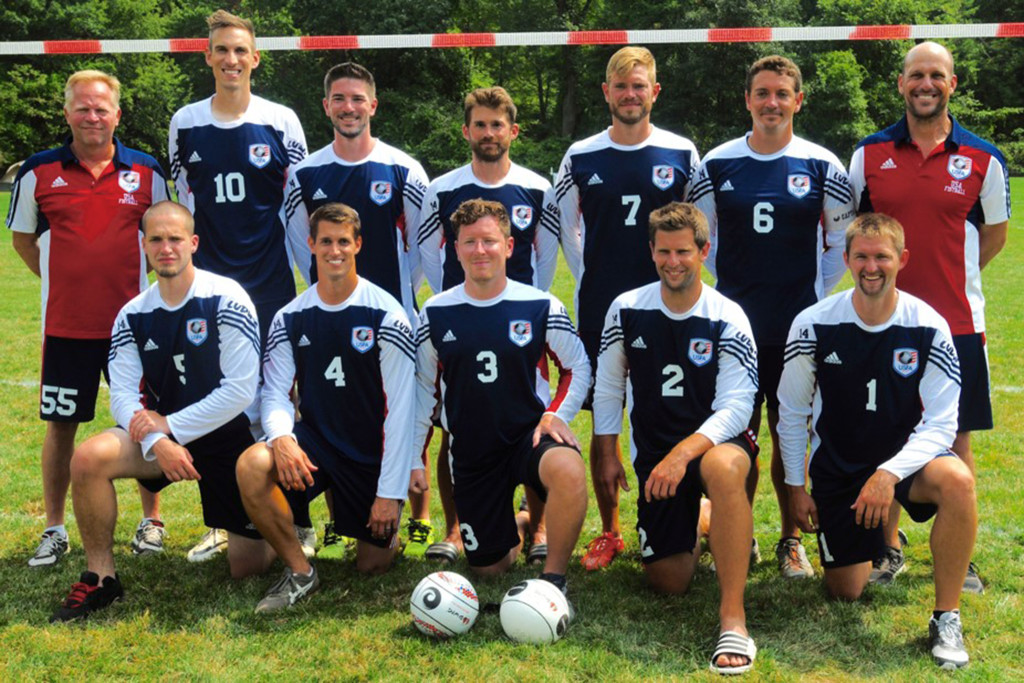
Gastão: The main goal for us was to bring international fistball to the country and motivate people to get more involved with the sport – this goal was achieved by 100 percent. With those events you also bring important people from politics and big sponsors to the sport. The city major of Flanders came to see the fistball games twice during the competition. The playing level (level of matches), the new teams, talking and practicing with people from different countries, these are all the small parts of that make a successful event.
IFA: The US Fistball Association has big aims, the World Cup 2019 should take place in the country, with Switzerland there is a strong contender in the mix. What do you think about the bid for the next World Cup?
Gastão: It’s a good challenge. It actually started with a joke to the players when I said: “Hey let’s organise a World Championship in Disneyworld. Everybody will bring their family and we will bring the biggest crowd fistball has ever seen to the USA.” Talking seriously, the Fistball World Championship is another size of competition, it’s not easy to manage with a bunch of people. We don’t want to organise a bad World Cup, if we were to do it, it would habe to be the best competition in fistball ever. You have to dream big and I think that it is possible.
IFA: You already told us that you want the team to play their best at every point. What is the best result the US fistball team can reach in Argentina?
Gastão: It’s not so easy to give an answer to this question because all the other nations have practiced for the last couple of years as well. I always tell my players: “The result is not the product, the result is the consequence of your training.” So I’m not talking about goals, I’m talking about the dreams we have. And our dream is to qualify for the World Games 2017 in Poland. Therefore we have to finish the tournament among the six best teams. This will be very hard to reach, but dreams are for free (laughs).
IFA: Gastão, thanks for the interview, we wish you and the US fistball team good luck in Argentina!
Interview: Valentin Weber, Austria


 English
English
